


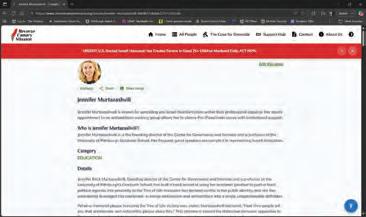









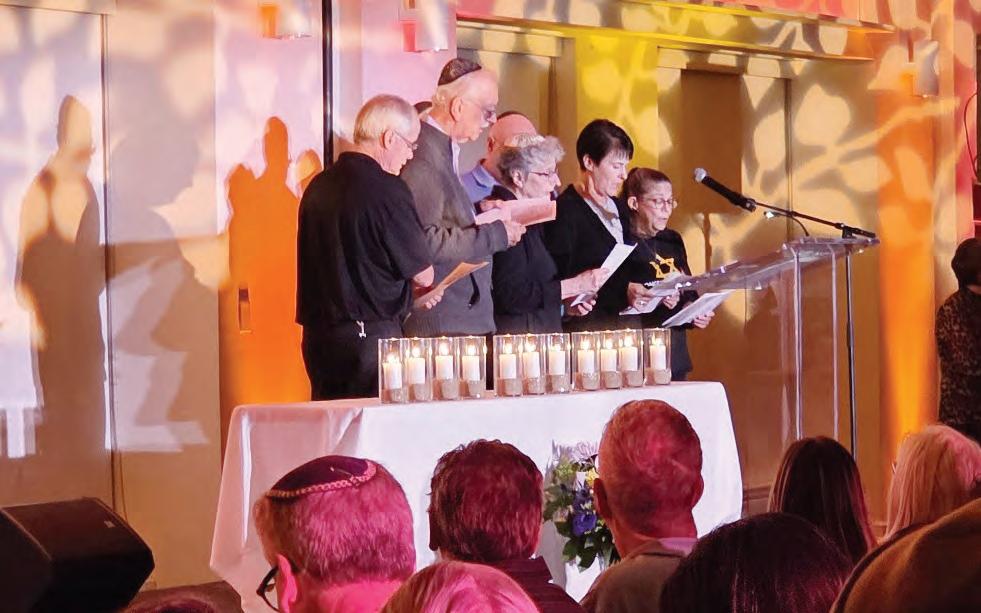
By David Rullo | Senior Sta Writer
Seven years after the most violent antisemitic attack in American history, Pittsburghers gathered to remember the 11 victims of the Oct. 27, 2018, synagogue shooting.
Joyce Fienberg, Richard Gottfried, Rose Mallinger, Jerry Rabinowitz, Cecil Rosenthal, David Rosenthal, Bernice Simon, Sylvan Simon, Daniel Stein, Melvin Wax and Irving Younger were murdered by a white supremacist the morning of Oct. 27, 2018, while celebrating Shabbat at three different congregations in the Tree of Life building — Dor Hadash, New Light and Tree of Life*Or L’Simcha.
The solemn ceremony held Monday night at the Jewish Community Center in Squirrel Hill included participation from family members of the victims, survivors of the attack, those who work to keep the Jewish community safe, a U.S. attorney and Pittsburgh’s CAPA high school.
Relatives of those murdered began the event by lighting 11 candles in memory of their loved ones, followed by Tree of Life’s Rabbi Jeffrey Myers chanting El Maleh Rahamim, the prayer for the souls of the departed.
This is Myers’ final year as rabbi at Tree
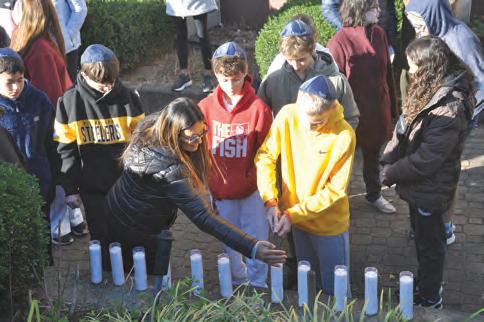
of Life, a congregation he led during the Pittsburgh synagogue shooting. He will retire next year.
“We pray for the elevation of their souls … Let the earth not cover their blood and let there not be a place sufficient for their cries,” Myers told the hundreds in attendance, his voice filled with emotion.
Members of CAPA’s vocals program performed two songs: “True Love” by Sheila Hunt-Johnson and “Total Praise” by Richard Smallwood. The music was followed by Barbara Caplan, Barb Davis and Eleanor Wible — representing New Light, Tree of Life and Dor Hadash, respectively — reading the poem “Epitaph,” which is often recited before Kaddish.
Rabbi Amy Bardack, the spiritual leader of Dor Hadash, and Soo Song, chief of the criminal division of the U.S. Attorney’s Office in the Western District of Pennsylvania, recited Mi Sheberach, the traditional Jewish prayer of healing.
Psalm 23 was read by Audrey Glickman, Deane Root, Rabbi Doris Dyen, Stephen Weiss, Lou Fineberg, Augie Siriano, Andrea Wedner and Rabbi Jeffrey Myers, survivors
the attack.

By Adam Reinherz | Senior Sta Writer
Hours before adults commemorated the events of Oct. 27, 2018, at the Jewish Community Center in Squirrel Hill, seventh and eighth graders from Jewish day schools in Pittsburgh and Cleveland gathered to honor the 11 people who were murdered in the Pittsburgh synagogue shooting. The Monday morning program welcomed more than 70 participants from Pittsburgh’s Community Day School and Cleveland’s Joseph and Florence Mandel Jewish Day School.
Standing outside the Tree of Life building on Oct. 27, young learners heard from Alan Hausman, Tree of Life Congregation’s president, about past atrocities and necessary steps toward a better future.

Refusing to mention the shooter’s name, Hausman recalled the events of Oct. 27, 2018, describing how a gunman entered the Tree of Life building and murdered 11 Jews from Tree of Life, New Light and Dor Hadash congregations.



however, this year, the festival will feature “twice as many headliners,” according to lead sponsor Seth Glick.

Harounoff, author of “Unveiled”; and Jeremy Dauber, author of “Jewish Comedy.”
that may or may not be truthful,” she said.
By Adam Reinherz | Senior Staff Writer
Landsmen who love literacy are in luck.
The Pittsburgh Jewish Book Festival is returning Nov. 8-13. Featuring an array of author talks, live music and ample snacks, the program, according to organizers, seeks to engage readers across the region.
Festival director Shari Woldenberg said the program’s purpose is to “gather people for civil discourse.”
There’s an inability to openly converse during “such a partisan time,” she said. “We want to be able to have a civil discourse about all the complex things going on in the world today, and also celebrate Jewish culture.”
The festival, which had similar goals last year, is growing.
Like its rollout, the program will again occur at Congregation Beth Shalom in Squirrel Hill;
“It’s important that Pittsburgh has a Jewish book festival, and the books and their authors were chosen to appeal not only to Beth Shalom members, but to all Pittsburghers,” added Glick (a Pittsburgh Jewish Chronicle board member).
Throughout the festival, attendees can hear from numerous local writers, including Jonathan Zisook, author of “From Centre to Periphery and Beyond”; Richard H. Weisberg, author of “Law, Literature and History”; Audrey Glickman, author of “Pockets”; Howie Ehrlichman, author of “Not a Bad Trip?”; Ilene Winn-Lederer, author of “An Illuminated Torah Commentary”; and Chris Hall, author of “Mythic Judaism.”
Headliners include Sam Sussman, author of “Boy from the North Country”; Ilan Stavans, co-author of “Sabor Judío”; Joshua Leifer, author of “Tablets Shattered”; Jonathan
Now entering its second year, the festival hopes to become a permanent Pittsburgh fixture, Woldenberg said.
Aiding that ambition, she continued, are several sponsors and two $5,000 grants from the Jewish Federation of Greater Pittsburgh, including one from Federation’s SteelTree Fund and another from Federation’s Arthur J. and Betty F. Diskin Cultural Endowment Fund.
The support, which offsets honoraria and related fees, is critical, Woldenberg said. “We’d like to keep building on that and just have this be more of a regular institution.”
Having a dedicated festival welcoming authors and enabling discussion of Jewish ideas behooves a city, she said.
Considering what’s occurring in Israel and elsewhere worldwide, “it’s important to understand the larger context, and to not just read one news source and think that you’re getting all your answers from that one news source

SUBSCRIPTIONS
subscriptions@pittsburghjewishchronicle.org
412-687-1000, ext. 2
TO ADVERTISE advertising@pittsburghjewishchronicle.org 412-687-1000, ext. 1
EDITORIAL DEPARTMENT
Email: newsdesk@pittsburghjewishchronicle.org
BOARD OF TRUSTEES
Evan H. Stein, Chair
Evan Indianer, Vice Chair
Derek Smith, Treasurer
Gayle R. Kraut, Secretary
Gail Childs, Dan Droz, Malke Steinfeld Frank, Seth Glick, Judith Kanal, Cátia Kossovsky, Charles Saul
GENERAL COUNSEL
Stuart R. Kaplan, Esq.
Jim Busis, CEO and Publisher 412-228-4690 jbusis@pittsburghjewishchronicle.org
EDITORIAL Toby Tabachnick, Editor 412-228-4577 ttabachnick@pittsburghjewishchronicle.org
Adam Reinherz, Senior Staff Writer 412-687-1000 areinherz@pittsburghjewishchronicle.org
David Rullo, Senior Staff Writer 412-687-1000 drullo@pittsburghjewishchronicle.org
ADVERTISING
Amy Weiss, Account Executive (412) 613-0697 aweiss@pittsburghjewishchronicle.org
PRODUCTION Jeni Mann Tough Production Manager Carl Weigel Art/Production Coordinator
There is a difficulty getting “real information and having real discussions,” she continued. “We don’t need to retreat into our polarized quarters.”
Easing access to the festival, and the opportunity to share ideas, is a tiered pricing system, Woldenberg said.
All non-headliner events (including, the local author showcase, sponsored speaker Adam Sobsey, Zoom lunch, and children and family program) are free. Tickets to single headliner events are $10. An all festival pass is $18; and a pass plus, which entitles its holder to all book festival events, as well as meet-andgreets with all the headliners, is $180.
The Pittsburgh Jewish Chronicle is a sponsor of the festival. Registration and a schedule of events is available at bethshalompgh.org. PJC
Adam Reinherz can be reached at areinherz@pittsburghjewishchronicle.org.
5915 Beacon St., 5th Floor Pittsburgh, PA 15217
Main phone number: 412-687-1000 Subscriptions: 412-687-1000, ext. 2
Subscriptions subscriptions@pittsburghjewishchronicle.org 412-687-1000, ext. 2
Published every Friday by the Pittsburgh Jewish Publication and Education Foundation 5915 Beacon St., 5th Floor Pittsburgh, PA 15217 Phone: 412-687-1000
POSTMASTER: Send address change to PITTSBURGH JEWISH CHRONICLE, 5915 BEACON ST., 5TH FLOOR PITTSBURGH, PA 15217 (PERIODICAL RATE POSTAGE PAID AT PITTSBURGH, PA AND AT ADDITIONAL MAILING OFFICES) USPS 582-740
Manuscripts, letters, documents and photographs sent to the Pittsburgh Jewish Chronicle become the property of this publication, which is not responsible for the return or loss of such items.
The Pittsburgh Jewish Chronicle does not endorse the goods or services advertised or covered in its pages and makes no representation to the kashrut of food products and services in said advertising or articles. The publisher is not liable for damages if, for any reason whatsoever, he fails to publish an advertisement or for any error in an advertisement. Acceptance of advertisers and of ad copy is subject to the publisher’s approval. The Pittsburgh Jewish Chronicle is not responsible if ads violate applicable laws and the advertiser will indemnify, hold harmless and defend the Pittsburgh Jewish Chronicle from all claims made by governmental agencies and consumers for any reason based on ads appearing in the Pittsburgh Jewish Chronicle

Eric Lidji | Special to the Chronicle
Ihad a song stuck in my head all summer. It was Chava Alberstein’s first recording of “Rabbeinu Tam,” the version from her 1967 album “Yiddish Folk Songs.”
The song condenses a millennium of Jewish culture into a hummable melody with fable-like lyrics by Yiddish poet Itzik Manger. In the song, the famed Talmudic commentator Rabbeinu Tam receives a mash note from the Queen of Turkey. He dismisses it as naarishkeit, nonsense. Then, his rebbetzin finds the note. Jealous and hurt, she beats her husband with a rolling pin. A coda reveals the affair to be a trifling fiction, conjured by a bored tailor unspooling the twilight hours before Shabbos ends.
Alberstein’s haunting interpretation turns this playful song into a wistful lament for the lost cultural world of the shtetl amid an emerging joyful Jewish future in Israel.
I first heard this song on “Israel Sings,” a radio program that aired on the earliest days of WYEP-FM. Edward Weinblum launched the show in 1975 and hosted for several years with a series of Israeli co-hosts, including Sarit Gamliel, Malka Weitzman and Lynda Aussenberg. Aussenberg appears to have carried the show into the 1980s.
Weinblum recorded some of his programs. His widow recently donated these recordings to the Rauh Jewish Archives, and we have added the entire collection to our website. It comprises 24 hour-long programs between June 1976 and January 1977.
Weinblum took the show seriously. He prepared careful playlists for each episode, often with scripted comments between songs. He read announcements from local congregations and organizations, as well as news from Israel. The July 25, 1976, episode includes a recording of Yitzhak Rabin discussing Operation Entebbe. The Israeli co-hosts presented all their song commentary in Hebrew, followed by an English translation.
By the mid-1970s, America still had Jewish immigrants from Eastern Europe who held an ancestral musical culture of Yiddish folk songs and Chazzanus. And so “Israel Sings” played Theodore Bikel and Cantor Moshe Taube and “Romania, Romania.”
At the same time, a newly ascendant Orthodoxy was developing a contemporary musical cultural through boys’ choirs and groups like Ruach Revival and Shma Kolanu. Israel was nearing the end of the heyday of its folk revival of the late 1960s, when acts like Chava Alberstein, Ilana Rovina, Nama Hendel and Ran Eliran were pairing traditional folk melodies with Jewish texts to create a new Israeli musical grammar.
And as Israel was completing its first quarter century, it was gaining confidence in its own culture. Musicians were developing secular Israeli takes on contemporary genres like musicals, disco and pop. Do you remember the groovy Israeli rock band Poogy?
“Israel Sings” played all of this music. When you hear Aris San, the Barry Sisters,

p Edward Weinblum produced and hosted the weekly WYEP-FM radio program “Israel Sings” and even created a promotional program for the show by hand.
Image courtesy of the Rauh Jewish Archives
Cantor Seymour Rockoff, Shuli Natan and the Choir of the Chief Rabbinate of the Israel Defense Forces, all within the span of an hour, you get a visceral sense of the diversity of global Jewish culture.
On air, Weinblum described “Israel Sings” as a founding member of the Heritage Broadcast Institute. Curious, I dug around and found an archival collection at the University of Pittsburgh. The collection had belonged to Marcel Kopp, a Belgian immigrant who was producing a music program on WYEP called “The French Horn.”
the mid-1970s, less than 5% of the metropolitan area was foreign born, smaller than Philadelphia, Detroit, Cleveland, Chicago and Boston. And while all those cities would see their foreign-born populations increase over the next 40 years, ours stalled.
Pittsburgh was no longer an immigrant city. It was a second-and-third-generation city. It was a city where many had a parent or grandparent from another part of the world.
A similar decline in the Jewish community prompted cultural heritage initiatives in the late 1960s and early 1970s, such as the National Council of Jewish Women Oral History Project, Judaica libraries at major universities, and the Western Pennsylvania Jewish History Project. Anxiousness about a fading heritage appeared as an occasional criticism of “Israel Sings,” that it didn’t play enough of the old Yiddish classics.
Heritage Broadcast Institute aimed higher than all this. It often insisted it was not a documentation effort, nor was it serving local communities. Through its distinct format, it wanted to model a multicultural ideal. “‘Living Heritage’ is not an ethnic series directed to any of the many ethnic groups in the area. No, ‘Living Heritage’ is (ethnic) people living, rejoicing, acting, producing among (American) peoples,” Kopp wrote.
Report illegal discrimination today.
A generation earlier, the “melting pot” theory had proposed that each new immigrant group would contribute to a shared
American culture. It did, but it also left those groups worrying whether they would disappear entirely through assimilation.
The U.S. Bicentennial year drew these complex feelings to the surface. In his first press release for the “Living Heritage” series, Kopp wrote, “The 200-year-long building of America by many peoples of foreign origins, their presence as part of America, their radiance in the American culture, is celebrated by a new joint radio broadcast.”
Already by early 1976, though, the radio stations were pulling back. WYEP dropped many Heritage Broadcast Institute programs in early 1976. “Israel Sings” survived the cut for a while, thanks to a write-in campaign from the Jewish community.
“Israel Sings” caught a moment. It existed through a combination of robust local media, changing ethnic demographics in the region, an emerging multiculturalism and a thriving Jewish musical cultural, all supercharged by the ferment of the Bicentennial.
At first I thought, “This could never happen today.” But with podcasting, it definitely could. What’s needed is dedicated people like Kopp, Weinblum and the others. PJC
Eric Lidji is the director of the Rauh Jewish Archives at the Heinz History Center. He can be reached at rjarchives@heinzhistorycenter. org or 412-454-6406.

Pittsburgh Commission on Human Relations
In March 1975, Kopp was invited to a one-day Conference on Ethnic Radio and the Community, sponsored by the new Study Center and Archive of Musical Pluralism at the University of Pittsburgh. SCAMP was created to document ethnic music in Western Pennsylvania. At the conference, Kopp and others founded the Heritage Broadcast Institute to revitalize the fading world of ethnic broadcasting in the city.
The Heritage Broadcast Institute was a brokerage service. It secured airtime on local radio stations, which it turned over to producers from different ethnic communities.
PghCHR investigates discrimination in housing, employment, public accommodations, and the delivery of city services, including the police. Scan this code to get started:
A robust media landscape made this possible. WYEP, WDUQ, WEDO, WAMO, WPIT and WPSL all participated. Commercial stations were generally locally owned and could make programming decisions. The late 1960s and early 1970s also saw the flourishing of full-power FM stations operated as community nonprofits. The National Federation of Community Broadcasters began in 1975 to advocate for these stations.
Heritage Broadcast Institute’s keynote project was “Living Heritage,” airing twice weekly on WDUQ. Each episode highlighted a different community. Titles spanned the globe: the French Horn, the Slovak Radio Program, Grecian Melodies, Hungarian Varieties, The Green Groves of Erin, the Polish Radio Hour, Israel Sings, Slavic Moods, the Arabic Hour, the Russian Hour, Regina del Mio Cuore and Ukrainian Music.
This international roster obscures Pittsburgh’s actual demographic makeup. By


Everyone deserves equal opportunity in Pittsburgh.
Experiencing discrimination—including antisemitism— in housing, employment, or public spaces? The Pittsburgh Commission on Human Relations (PghCHR) investigates complaints, educates communities about their rights, and advances protections in City Code so every person can live, work, and thrive.
We’re here to help with:
• Discrimination investigations (including antisemitism)
• Outreach & education on your rights
• Policy recommendations for stronger protections Contact us:
412-255-2600 | human.relations@pittsburghpa.gov
Hours: Mon–Fri, 9am–5pm (closed City holidays) Please call or email to schedule—walk-ins not available.
PghCHR — Promoting justice, dignity, and understanding across our city.
By David Rullo | Senior Staff Writer
Rona Kaufman isn’t concerned about being listed on the website Reverse Canary Mission.
“If there’s an organization that wants to amplify my voice, I love that. That’s the greatest thing ever,” said Kaufman, an associate professor at Duquesne University’s law school. “Tell people that I am defining anti-Zionism as a hate movement that spreads vicious libel against the Jewish people through the state of Israel, with the purpose of stigmatizing Jews and ultimately justifying and motivating violence, including death against us, and then later denying it.”
That’s probably not the reaction the administrators of the website were aiming for when they listed Kaufman.
Calling itself a “grassroots, volunteer-based community initiative dedicated to collective liberation and justice for all people,” Reverse Canary Mission exposes people whom it perceives to be pro-Israel.
It claims, though, its mission is to highlight “individuals who advocate for the ethnic cleansing and genocide of the Palestinian people.”
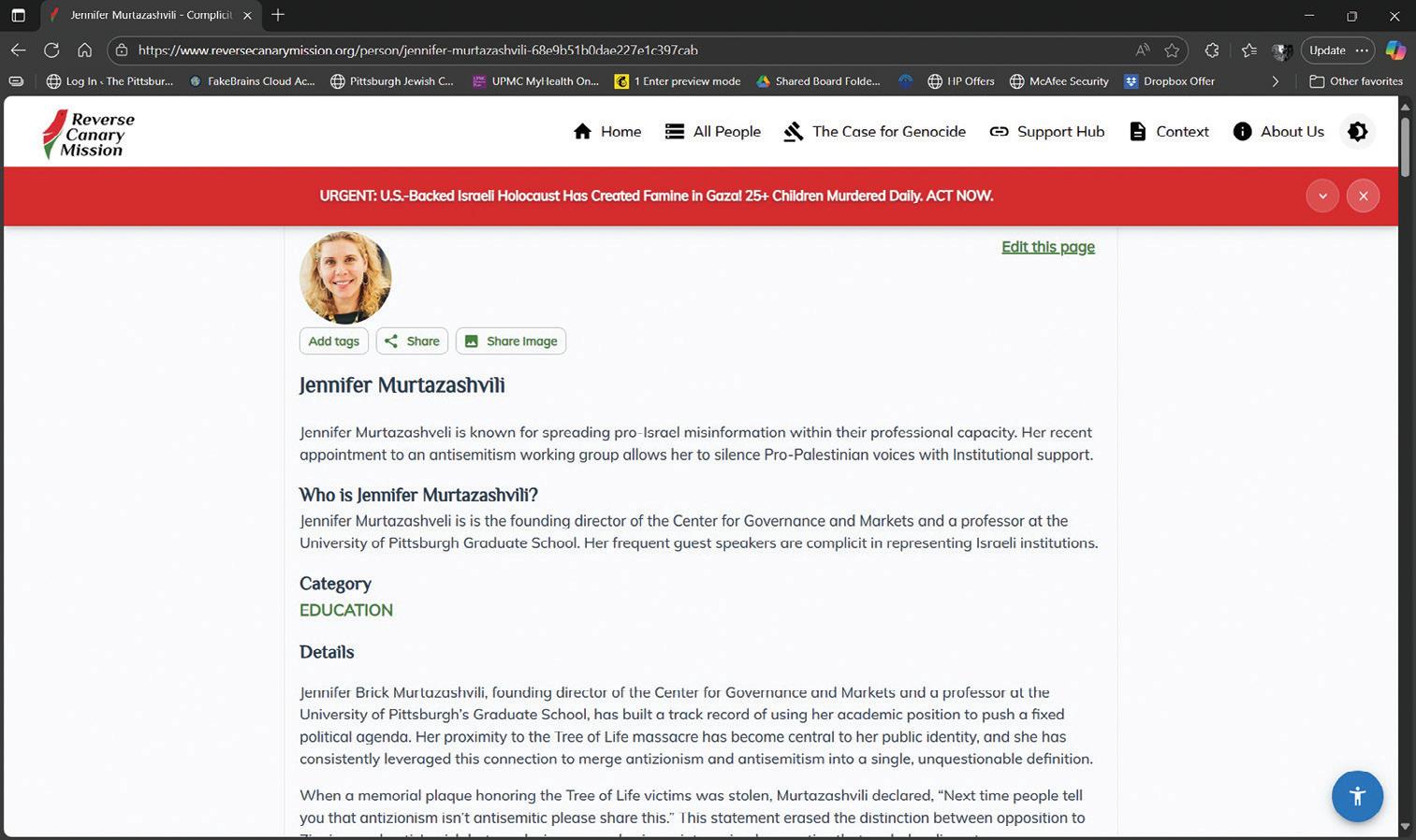
p Jennifer Murtazashvili is just one Pittsburgher targeted on the Reverse Canary Mission website. Screenshot by David Rullo
Kaufman has never advocated for ethnic cleansing or genocide. In fact, most people listed on the website — including a number of Pittsburghers — apparently are on the site because they signed a letter arguing for the right of Israel to defend itself or did not criticize the Jewish state loudly enough. Singer Billie Ellish is listed on the site despite wearing a red hand pin to the 2024 Oscars as part of the Artists4Ceasefire campaign.
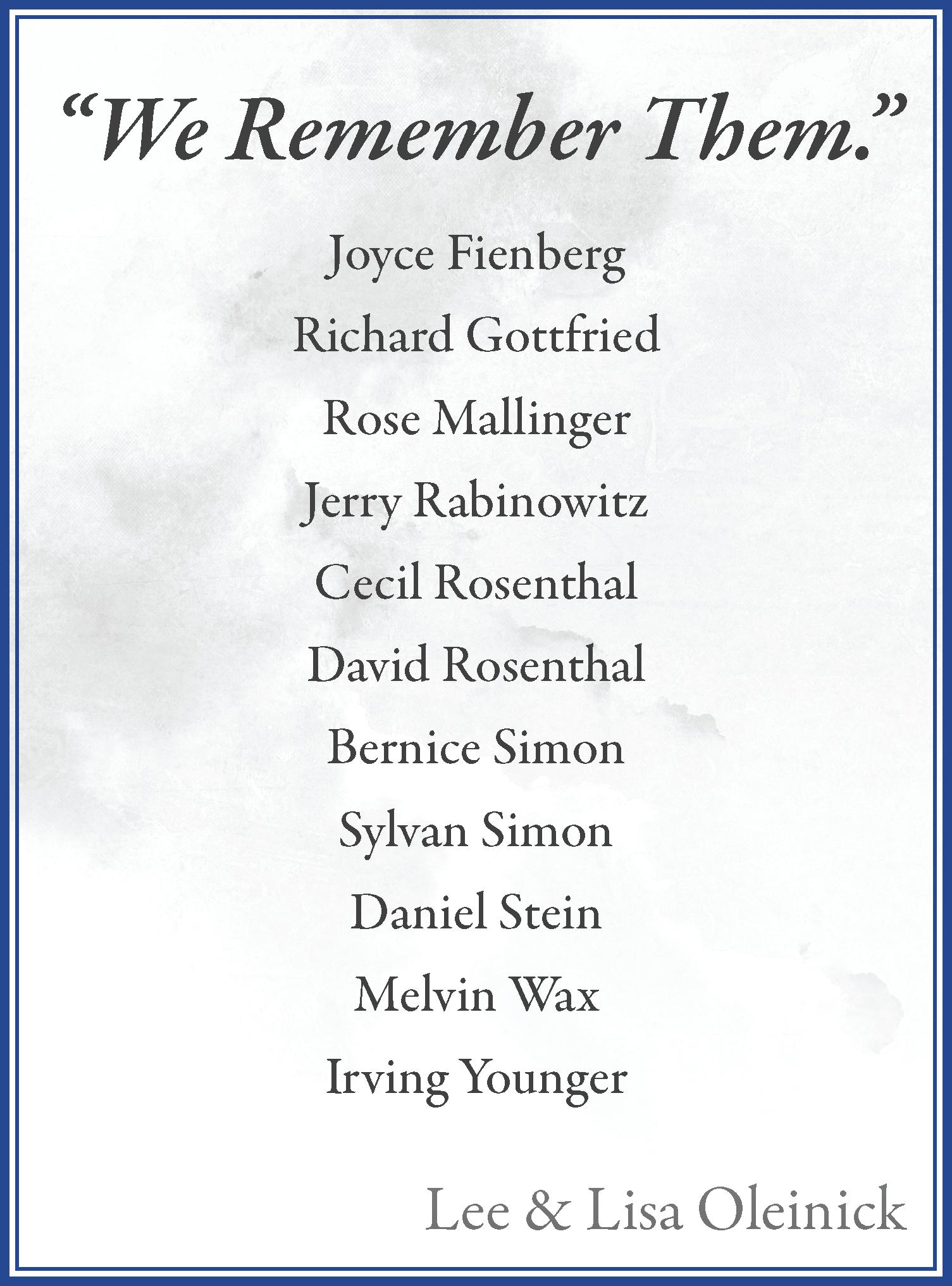
the list,” he said. “If there are dozens of Muslim states, then we can certainly have one country for Jews where they should be able to protect themselves and live safe from holocausts and things like that. So, the fact that I made the list is a surprise, but I guess I deserve it.”
Rapper Kanye West, who has a long history of antisemitic statements, also is included.
The schizophrenic site even lists Rep. Ilhan Omar, who supports the BDS movement and has called for ending weapon sales and financial support to Israel. Her frequent outbursts against Israel have often led to accusations of antisemitism. But she made the site because she voted in favor of a House resolution that affirmed Israel’s right to exist.
Reverse Canary Mission was launched in response to another controversial website — Canary Mission — which purports to “document individuals and organizations that promote hatred of the USA, Israel and Jews on North American college campuses and beyond.”
Both sites include photos of their various subjects and information about what earned them a place on the webpage.
Kaufman’s offense is that she signed the “Scholars of Truth about Genocide” letter written in September, 2025, in response to a letter written by the International Association of Genocide Scholars condemning Israel.
“They accused Israel of genocide and then the group was exposed for not being a group of scholars — anyone could join. It was a $25 membership fee,” Kaufman said. Only 20% of the organization’s members voted on the issue and, of those, only 80% voted in favor of the letter.
While Reverse Canary Mission said the letter signed by Kaufman “attempts to whitewash, sanitise (sic) and legitimise (sic) Israel’s ongoing genocide in Palestine by distorting law, erasing systemic violence and framing Palestinian resistance as terrorism,” Kaufman said it is Reverse Canary Mission that has the facts wrong.
“We went through what genocide in law means and refuted the argument,” she said.
Pittsburgher Jeffrey Pollock, an attorney, is also listed on the website. Like Kaufman, he caught the administrators’ attention by signing the Scholars of Truth letter. The site also notes Pollock’s past role as the president of the Pittsburgh chapter of the Zionist Organization of America.
Like Kaufman, he isn’t intimidated by his inclusion.
“I take it as a badge of honor that I made
Reverse Canary Mission, Pollock said, is akin to the McCarthyism of the 1950s that sought to scapegoat some Americans.
“I certainly don’t enjoy being on the receiving end,” he said.
Kaufman, who has received death threats over the last two years, said she views the site as an “implicit threat.”
“It’s quite unpleasant to receive those messages, but I guess we live in a world where it only takes a person a second to click on something and say something ugly,” she said.
Jennifer Murtazashvili, professor and founding director of the University of Pittsburgh’s Center for Governance and Markets, also made the list. She apparently is listed because she is a member of the university’s antisemitism working group.
Murtazashvili’s inclusion was amplified on social media by one local virulent anti-Zionist, a social worker whose past X posts have included, “If I say what Israel deserves I will be thrown in prison,” and “I woke up hating Israel even more than I did yesterday.”
“It feels personal,” Murtazashvili said. “They are ‘warning’ people at Pitt about me so clearly; they were tipped off to my inclusion, which is why they’re sharing.”
The Pitt professor has been the target of several antisemitic and anti-Zionist attacks over the last few years.
“This is very personal targeting that I have to involve the campus police in,” she said. “It’s unacceptable.”
The threats, she said, are intended to silence free speech, which, ironically, the creators of the site and those who promote it claim to support. But she refuses to feel less safe.
Murtazashvili isn’t bothered by the existence of the website, or that of the original Canary Mission. Free speech, she said, is a fundamental right in America. Instead, it’s the attempt to harass and intimidate people with which she has an issue.
“I’m a free speech absolutist,” she said, noting she has defended the right of proPalestinian speakers to appear on campus.
“The worst thing we can do as a Jewish community is silence free speech. In the marketplace of ideas, the more people who support Hamas are able to speak, the public will see that and understand.”
Kaufman agrees with Murtazashvili regarding free speech. But reverse Canary Mission, Kaufman said, fails at its most fundamental level.
“I thought, ‘My goodness, this is great. The website will be a resource for me to find all the other Zionists out there because we have not compiled our own list of people in academia or politics.’ But it turns out the threshold for being exposed by them is so low it’s not helpful to me.” PJC
David Rullo can be reached at drullo@ pittsburghjewishchronicle.org. — LOCAL —
‘The church is asleep right now’: Ted Cruz calls on Christians to confront right-wing antisemitism
By Asaf Elia-Shalev | JTA
Sen. Ted Cruz used his keynote address at a major gathering for Christian supporters of Israel last week to warn of “a growing cancer” of antisemitism on the right, which he said church leaders are failing to address.
“I’m here to tell you, in the last six months, I have seen antisemitism rising on the right in a way I have never seen in my entire life,” Cruz said, speaking on Sunday at a megachurch in San Antonio, led by John Hagee, the founder of Christians United for Israel, which claims to have more than 10 million members.
He continued, “The work that CUFI does is desperately, desperately needed, but I’m here to tell you, the church is asleep right now.”
In the days around Cruz’s speech at Hagee’s 45th annual Night to Honor Israel, a cluster of conservative voices made similar appeals, arguing that antisemitism inside parts of the right can no longer be waved away as fringe. Essays in The Free Press and Tablet mapped how extremist figures and ideas have been normalized and the Jewish educational center and think tank Tikvah warned of a “clear faction” hostile to Israel and Judaism.
In The Free Press, conservative columnist Eli Lake published an essay titled “How Nick Fuentes Went Mainstream,” arguing that the far-right activist — long shunned for racist and antisemitic rhetoric — has lately been welcomed by a roster of popular podcasts and livestreams. In Lake’s telling, the “stigma” around Fuentes has “melted away,” an index of how the Overton window has shifted inside parts of the online right.
At Tablet, a first-person essay by a libertarian insider headlined “Hitler Is Back in Style,” traced what the author describes as a libertarian-to-alt-right pipeline that, over the past decade, normalized conspiratorial thinking about Jews and open flirtations with Hitler apologetics. The piece

is both confessional and diagnostic, naming podcast ecosystems and ideological crosscurrents that, the author argues, have turned “antiwar” rhetoric into reflexive antiIsrael sentiment and a broader hostility to Jews.
Meanwhile, Tikvah, one of the most prominent right-wing groups in the Jewish world, noted in an email to supporters Thursday that it has tracked the same trend.
“Today, there is a clear faction of the right that is overtly hostile to Israel and to Judaism. And though small, it is no longer marginal or possible to ignore,” wrote Avi Snyder, a senior director at Tikvah.
The organization pointed to a body of essays it began publishing in 2023, warning that some on the right were reviving old suspicions about Jewish loyalty, casting the U.S.-Israel alliance as a trap, and disputing the moral superiority of the Allied fight in World War II.
In the background is the aftershock of Charlie Kirk’s assassination last month, which unleashed a torrent of conspiracies that quickly turned antisemitic in parts of the right’s online ecosystem. Fact-checkers documented a flood of false claims, while some influencers
toyed with theories about Israeli or “Mossad” involvement — rhetoric with enough popular traction that Israel’s prime minister, Benjamin Netanyahu, felt compelled to issue a rebuttal. The swirl reinforced how fast fringe ideas migrate in today’s media sphere, even as prosecutors in Utah have charged a suspect and outlined a motive that has nothing to do with Israel.
In his speech, Cruz noted he has talked to Netanyahu about declining support for Israel on the right — and that the two men see the issue differently.
He recounted a recent conversation with the Israeli prime minister, saying that Netanyahu’s first instinct was to chalk much of it up to foreign amplification from places like Qatar and Iran — bots and paid misinformation networks.
Cruz pushed back: “I said, ‘Mr. Prime Minister, yes, but no. Yes, Qatar and Iran are clearly paying for it, and there are bots, and they are putting real money behind it, but I am telling you, this is real, it is organic, these are real human beings, and it is spreading.’”
Later in his address, Cruz highlighted the drift’s theological dimension. He warned of a resurgence of replacement theology, which
he characterized as a “lie that the promises God made to Israel and the people of srael are somehow no longer good, they are no longer valid.”
According to replacement theology, the Israelites were supplanted as God’s chosen people once the Christian church was founded.
uz didn’t blame anyone by name, but his comments come as figures with long records of inflammatory commentary toward Jews or Israel have continued to gain oxygen. Fuentes has rebounded from ostracism to high-visibility bookings; Tucker Carlson draws millions f viewers amplifying narratives that edge into Jew-baiting; and Candace Owens’ conspiratorial comments about Israel continue to ull audiences.
Together they form a feedback loop in which algorithmic reach and controversy reward edgier takes — and make it harder for party actors to draw lines.
Adding to the fray is last week’s Young Republicans leak, a Politico exposé of a Telegram chat where early-career GOP activists traded racist slurs, joked about gas chambers and praised Hitler. The episode prompted firings, the shutdown of state Young Republican chapters and bipartisan condemnation. But Vice President J.D. Vance downplayed the messages as immature “jokes” and urged critics to “grow up,” a stance that itself became part of the week’s debate over whether the right will police its own.
Soon after Kirk’s assassination, Rich Goldberg, a senior adviser at the Foundation for Defense of Democracies and a veteran of Republican politics, urged more policing on the right. In a post on X, he called on conservatives to stop booking Carlson, calling the former Fox News host’s posture toward Jews and Israel “a disease that is poisoning the Republican Party.” He added, “It needs to be met with a decision by those we call ‘leaders’ to stop platforming him (and those who echo such vile sentiments).”
More than a month later, the most important right-wing leader in the country, Donald Trump, has yet to weigh in. PJC
By Toby Tabachnick | Editor
APittsburgh man who identifies as a Hamas operative is asking a federal judge to release him from prison as he awaits trial on charges related to vandalism of local Jewish institutions and conspiring with another defendant to build bombs.
Mohamad Hamad, a dual citizen of the United States and Lebanon, was arrested in October 2024, along with Talya Lubit, in connection with antisemitic graffiti spray painted at both Chabad of Squirrel Hill and the Jewish Federation of Greater Pittsburgh. In late April, the federal government announced
a superseding indictment returned by a grand jury charging Hamad, Lubit and Micaiah Collins — the daughter of anti-Israel activist and local pastor Chad Collins — with conspiracy, defacing and damaging religious property, making false statements and the possession of destructive devices.
Lubit pled guilty to damaging religious property and conspiring to commit an offense against the United States and was sentenced in September to five years of probation and ordered to pay $10,534 in restitution.
At a May hearing, Hamad was detained without bail pending trial when U.S. Magistrate Judge Patricia Dodge determined that no conditions existed in which the safety of the community could be reasonably assured if he were released.
At the hearing, prosecutors alleged that Hamad “shared violent militant pro Hamas, pro Hezbollah content, including from the October 7 attacks of multiple murdered individuals. When he shared these videos, he stated things like ‘Us Muslims never surrender or back down’ and ‘Lebanon just smoked they ass.’
“He shared a video of children being indoctrinated with Hamas propaganda,” prosecutors said. “He threatened people online. He stated his desire for bullets to touch the foreheads of Zionists. He expressed a desire to fight and die as a martyr. He called himself a terrorist and a Hamas operative. He bragged about stealing flags and terrorizing residents while dressed as a Hamas operative. He spray painted a Hamas target on to a Jewish institution. He
manufactured and tested explosives, including pipe bombs and explosives with shrapnel.”
Hamad argues in his motion to revoke the detention order that he is not a flight risk because he has family “and lifelong community ties” to western Pennsylvania. He further argues that he should be released pending trial because of his “alternating academic and employment history,” his lack of a previous criminal record and his “worsening medical condition while in custody.” No details regarding his alleged medical condition are disclosed in the motion.
The government has until Nov. 5 to respond to Hamad’s motion. PJC
Toby Tabachnick can be reached at ttabachnick@pittsburghjewishchronicle.org.
Submit calendar items on the Chronicle’s website, pittsburghjewishchronicle.org. Submissions also will be included in print. Events will run in the print edition beginning one month prior to the date as space allows. The deadline for submissions is Friday, noon.
SUNDAYS, NOV. 2, 9, 23
Join Chabad Young Professionals for Mommy and Me, a special space for moms and their little ones to connect, play and build Jewish community. Join them for this three-part series celebrating the beauty and warmth of fall. RSVP required. 10 a.m. $10. CYP Loft. cyppittsburgh.com/MM.
SUNDAYS, NOV. 2-DEC. 28
Join Chabad of Squirrel Hill for its Men’s Tefillin Club Services and tefillin are followed by a delicious breakfast and engaging discussions on current events. 8:30 a.m. 1700 Beechwood Blvd. chabadpgh.com.
Join a lay-led online Parashah study group to discuss the weekly Torah portion. No Hebrew knowledge needed. The goal is to build community while deepening understanding of the text. 8:30 p.m. For more information, visit bethshalompgh.org/online-parashah.
MONDAYS, NOV. 3-DEC. 29
Join Congregation Beth Shalom for a weekly Talmud study. 9:15 a.m. For more information, visit bethshalompgh.org.
Join Temple Sinai for an evening of mahjong every Monday (except holidays). Whether you are just starting out or have years of experience, you are sure to enjoy the camaraderie and good times as you make new friends or cherish moments with long-term pals. All are welcome. Winners will be awarded Giant Eagle gift cards. All players should have their own mahjong cards. Contact Susan Cohen at susan_k_cohen@yahoo.com if you have questions. $5. templesinaipgh.org.
TUESDAYS, NOV. 4-NOV. 26
Enter the intricate world of the Talmud, the
monumental classic that has defined Jewish learning for centuries. Discover its history, authors and significance — and experience it for yourself. You’ll learn the key terms, logical principles and historical context required to decode every part of the Talmudic page. Classes given by Chabad Young Professional’s Rabbi Henoch Rosenfeld. 7:45 p.m. $36. cyppittsburgh.com/Talmud.
TUESDAYS, NOV. 4-JUNE 30, 2026
Join Beth El’s Rabbi Alex Greenbaum and his Bible/ Talmud Adult Education class for a thought-provoking weekly session of Bible and Talmudic study. This program is available both in person and virtually. Please call the o ce at 412-561-1168 to receive the Zoom link or to make an in-person reservation. 10:30 a.m. 1900 Cochran Rd. bethelcong.org.
WEDNESDAY, NOV. 5
Chabad of the South Hills invites you to attend its November Senior Luncheon. Enjoy a delicious lunch and presentation on brain health by Comfort Keepers. Wheelchair accessible. $5 suggested donation. 1 p.m. 1701 McFarland Rd. chabadsh.com.
Kerry Wallach will deliver the inaugural Edith Balas Memorial Lecture. Her talk, “Recovering the Lost Worlds of Jewish Artist Rahel Szalit,” will focus on her process of rediscovering Rahel Szalit, one of the best known Jewish women artists in Weimar Germany, whose work was largely forgotten in the wake of the Holocaust. Free. 5:15 p.m. Cathedral of Learning, Humanities Center (602), Fifth Avenue at Bigelow Boulevard. calendar.pitt. edu/event/recovering-the-lost-worlds-of-jewish-artistrahel-szalit.
WEDNESDAYS, NOV. 5-DEC. 10
Join Chabad of the South Hills for a new JLI course, “The Kabbalah of Meaning,” exploring Jewish wisdom for finding the purpose that connects parts of life. No previous Jewish learning required. Online or in person. This course will satisfy the continuing education requirements of physicians, health care professionals,
psychologists, social workers, LMFTs and LMHC/LPCs. 7:30 p.m. chabadsh.com.
WEDNESDAYS, NOV. 5–DEC. 31
Bring the parashah alive and make it personally relevant and meaningful with Rabbi Mark Goodman in this weekly Parashah Discussion: Life & Text. 12:15 p.m. For more information, visit bethshalompgh.org/life-text.
Join Chabad of the South Hills for Baby Loves Shabbat, music and movement for ages 0 to 3. Challah making and Shabbat songs. 3:45 p.m. 1701 Bower Hill Road. chabadsh.com.
THURSDAYS, NOV. 6, DEC. 4, JAN. 8, FEB. 5
Join Rabbi Amy Greenbaum and the Beth El community for the all-virtual Beth El’s Virtual Hope and Healing Program on the first Thursday of the month. This is a safe space to chant, breathe, pray for healing and seek peace. Feel free to keep your camera o and just listen. Call the o ce at 412-561-1168 to receive the Zoom link. 5:30 p.m. Free. bethelcong.org.
THURSDAYS, NOV. 6, JAN. 15, MARCH 12, APRIL 30, JUNE 25
In the ever-evolving landscape of legal practice, understanding the interplay between faith and governance is crucial for lawyers. Join Rabbi Danny Schi for an engaging CLE series that explores many intriguing questions. Individual classes: $45 with credit/$40 without credit. 8:30 a.m. Virtual. For a complete list of class dates and subjects, visit Jewishpgh.org/event.
FRIDAY, NOV. 7
Kick o the month with the Chabad Young Professionals at their special First Friday Shabbat Dinner. Enjoy an elevated Shabbat experience featuring a four-course sitdown dinner, warm ambiance and exceptional company. Space is limited. Register early to secure your spot. 7 p.m. $18. cyppittsburgh.com/ .
SATURDAY, NOV. 8-THURSDAY, NOV. 13
SUNDAY, NOV. 9
Join Rodef Shalom Congregation at Fifth and Morewood (Rodef Shalom Congregation) for the annual Ruth and Bernard Levaur Contemporary Lecture. Rabbi Danny Schi will present “What Our Current Jewish Reality Demands of Us.” 7 p.m. Free. 4905 Fifth Ave. rodefshalom.org/levaur.
THURSDAY, NOV. 13
Come together for a chance to learn, laugh and share in the joy of baking with friends at Chabad Young Professionals’ Rugelach Bake. Join them for a cozy, hands-on evening as you roll, fill and bake everyone’s favorite Jewish pastry — rugelach. Learn the art of creating these flaky, irresistible treats from scratch while enjoying good company, light refreshments and warm community vibes. For men and women. 7:30 p.m. $15. cyppittsburgh.com/Bake.
SATURDAY, NOV. 15
Join Rodef Shalom Congregation at Fifth and Morewood for a Strauss/Warschauer Duo Klezmer Concert featuring Deborah Strauss (violin, accordion, vocals, dance) and Cantor Je Warschauer (guitar, mandolin, vocals), part of a weekend festival of Yiddish culture. 7 p.m. $10. 4905 Fifth Ave. Find out more about festival programs and purchase concert tickets at rodefshalom.org/yiddish.
SUNDAY, NOV. 16
Join Young Peoples Synagogue for a Jewish Pittsburgh bus tour of the North Side hosted by Eric Lidji, director of the Rauh Jewish Archives. Breakfast at 9 a.m. in the YPS social hall at Denniston and Forbes; the trolley leaves at 10 a.m. $36. Open to YPS members, guests and the Jewish community. For more information, call Rebecca Spiegel at 412-421-3213, or email rebecca.spiegel1@verizon.net. Deadline to register is Nov. 3, 2025.



































Congregation Beth Shalom invites you to the second annual Pittsburgh Jewish Book Festival. Most authors are free, but headliners either cost $10 per ticket, $18 for an All-Festival Pass or $180 for a Pass Plus, which includes meet-and-greets. Our low prices are made possible by the Jewish Federation of Greater Pittsburgh, a generous member family and the Pittsburgh Jewish Chronicle. 5915 Beacon Street. bethshalompgh. org/2025-jewish-book-festival.
The Pittsburgh Jewish Chronicle invites you to join the Chronicle Book Club for its Dec. 7 discussion of “Hostage,” by Eli Sharabi.
All are welcome to join Rodef Shalom and Temple Sinai as they’re joined by Anna Kislanski, CEO of the Israel Movement for Reform and Progressive Judaism, for a conversation about the Reform Movement in Israel 7 p.m. Free. 4905 Fifth Ave. RSVP at rodefshalom.org/reform.
TUESDAY, NOV. 18
Join Chabad of Squirrel Hill for Tanya and Tea, a weekly Torah class exploring our inner world and strategies for spiritual growth. 7 p.m. Email caltein@chabadpgh.com for the address. chabadpgh.com. PJC
How it works
We will meet on Zoom on Sunday, Dec. 7, at 1 p.m.
What to do
Buy: “Hostage.” It is available at area Barnes & Noble stores and from online retailers, including Amazon and Barnes & Noble. It is also available through the Carnegie Library system.






From Amazon.com: “On October 7, 2023, Hamas terrorists stormed Kibbutz Be’eri, shattering the peaceful life Eli Sharabi had built with his British wife, Lianne, and their teenage daughters, Noiya and Yahel. Dragged barefoot out his front door while his family watched in horror, Sharabi was plunged deep into the suffocating darkness of Gaza’s tunnels. As war raged above him, he endured a grueling 491 days in captivity, all the while holding onto the hope that he would one day be reunited with his loved ones.
Email: Contact us at drullo@pittsburghjewishchronicle.org, and write “Chronicle Book Club” in the subject line. We will send you a Zoom link for the discussion meeting. PJC








“Eli Sharabi’s story is one of hunger and heartache, of physical pain, longing, loneliness and a helplessness that threatens to destroy the soul. But it is also a story of strength, of resilience, and of the human spirit’s refusal to surrender. It is about the camaraderie forged in captivity, the quiet power of faith, and one man’s unrelenting decision to choose life, time and time again.”
Your hosts
Toby Tabachnick, Chronicle editor
David Rullo, Chronicle senior staff writer


1,000+ rabbis sign letter opposing Mamdani and the ‘political normalization’ of anti-Zionism
As the New York mayoral election draws near, more than 1,000 rabbis and cantors from across the United States have signed onto a letter voicing their opposition to mayoral frontrunner Zohran Mamdani and the “political normalization” of antiZionism, JTA reported.
The letter, titled “A Rabbinic Call to Action: Defending the Jewish Future,” cited Mamdani’s previous defense of the slogan “globalize the Intifada,” his denial of “Israel’s legitimacy” and his accusations that Israel has committed a genocide in Gaza.
Several influential rabbis signed on, including the author and former leader of Los Angeles’ Conservative Sinai Temple David Wolpe; Denise Eger, the first openly LGBTQ+ rabbi to head the Central Conference of American Rabbis; and Marc Schneier, who has frequently criticized Mamdani since before the primary from his pulpit on Long Island.
Among the signatories were several Pittsburgh rabbis, including Aaron Bisno, Daniel Fellman, Jamie Gibson, Mark Mahler, Danny Schiff and Daniel Yolkut.
The candidate has said Israel has a right to exist as a state with “with equal rights for all”; he has also said he would “discourage” the phrase “globalize the intifada,” acknowledging that it makes some Jews scared, and would arrest Israeli Prime Minister Benjamin Netanyahu if he visited New York.
“We will not accept a culture that treats
Jewish self-determination as a negotiable ideal or Jewish inclusion as something to be ‘granted,’” the letter says. “The safety and dignity of Jews in every city depend on rejecting that false choice.”
Trump nominee who said he had a ‘Nazi streak’ forced out before Senate confirmation hearing
Paul Ingrassia pulled out of contention for a top legal role in the Trump administration after losing key Republican support over revelations of private texts in which he declared, “I have a Nazi streak,” JTA reported.
Ingrassia had faced criticism over his links to the avowed white supremacist Nick Fuentes and the antisemitic influencer Andrew Tate since his nomination in May.
But the January 2024 texts, first reported by Politico last week, showed that he personally had used a slur against Black people, called for the abolition of the Martin Luther King Jr. federal holiday and expressed an affinity for Nazism.
Late last Tuesday, Ingrassia announced that he would not appear in the Senate as planned on Thursday — though he indicated that he would keep his current lower-level role.
“I will be withdrawing myself from Thursday’s HSGAC hearing to lead the Office of Special Counsel because unfortunately I do not have enough Republican votes at this time,” Ingrassia tweeted. “I appreciate the overwhelming support that I have received throughout this process and will continue to serve President Trump and this administration to Make America Great Again!”
Four Republican senators, including Senate Majority Leader John Thune, publicly expressed opposition to Ingrassia’s
Nov. 3, 1878 — Petah Tikvah is founded
details.
Oct. 31, 1924 — Educator Rabbi Yehuda Amital is born
Rabbi Yehuda Amital is born in Romania. A survivor of a Nazi labor camp, he establishes Yeshivat Har Etzion as a less doctrinaire school and launches the Meimad movement as an alternative to the National Religious Party.
Nov. 1, 1965 — Eshkol’s party wins sixth Knesset election
Prime Minister Levi Eshkol, David BenGurion’s chosen successor but then his political rival, retains his office when the Alignment, a merger of Eshkol’s Mapai and Ahdut Ha’Avoda, wins 45 seats in the sixth Knesset.
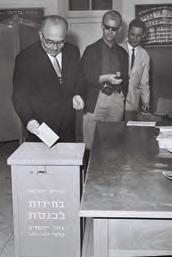
1, 1965. By Moshe Pridan, Israeli Government Press Office, CC BY-SA 3.0
Nov. 2, 1917 — British issue
Balfour Declaration
A letter from Foreign Secretary Arthur Balfour reveals the British government’s endorsement of “the establishment in Palestine of a Jewish national home.” The wording is included in the Mandate for Palestine in 1922.
nomination after the revelation of the private texts, which included both racist and antisemitic content.
Federal judge allows Northwestern to block enrollment for students who boycotted antisemitism training
A federal judge in Chicago allowed Northwestern University to discipline students who refused to watch an antisemitism training video, JTA reported.
Judge Georgia Alexakis last week declined to issue a restraining order in a lawsuit filed by Northwestern Graduate Workers for Palestine and two graduate students. The plaintiffs claimed that an antisemitism training required by the school for enrollment was biased and discriminatory toward Palestinian and Arab students.
“Northwestern University’s Training is not intended to foster a civil and collaborative workplace or remedy discrimination but rather is aimed at suppressing political anti-Zionist speech and speech critical of Israel,” the complaint read.
The “Antisemitism Here/Now” training video, produced by the Jewish United Fund of Chicago, the city’s Jewish federation, did not ask students to agree with its contents. Fewer than three dozen students declined to watch it in protest.
Attorneys for Northwestern said that 16 students currently face enrollment holds for failing to watch the training, though they added that they were unsure if all students affected did so out of protest.
In her ruling, Alexakis acknowledged that the graduate students affected by the holds face “irreparable harm,” but said that the students’ lawyers had failed to prove
Northwestern had a discriminatory motive in requiring the video.
The complaint also criticized the school for adopting the International Holocaust Remembrance Alliance’s definition of antisemitism, which the complaint said “effectively limits Arab students, and particularly Palestinian students, in their expressions of nationalist aspirations and protest against mistreatment of their ethnic group.”
The antisemitism training was announced by Northwestern in March in an email to the student body that cited President Donald Trump’s Jan. 29 executive order, “Additional Measures to Combat Anti-Semitism.”
Posters of dozens of now-freed Israeli hostages that have lined Israel’s main international airport for nearly two years are being gradually removed in coordination with their families, the Israel Airports Authority said last week, JNS reported.
The posters were being taken down one by one by individual family members at their convenience, an airport spokeswoman said.
The Ben-Gurion Airport departure hall exhibition served as a reminder of the national anguish over the hostages taken during the Hamas-led Oct. 7, 2023 massacre, when 251 people were abducted to Gaza.
The final 20 living hostages were released on Oct. 13 as part of a ceasefire agreement. Under the terms of the agreement, Hamas was also required to return all 28 bodies it was holding, but so far the terrorist group has returned only 15. PJC
— Compiled by Toby
Tabachnick
Religious Jews determined to start an agricultural settlement leave Jerusalem and establish Petah Tikvah (“Gateway of Hope”). They purchase 3,400 dunams (840 acres) from a Greek owner near the Yarkon River.
Nov. 4, 1995 — Rabin is assassinated
Yigal Amir, a law student opposed to the Oslo peace process, fatally shoots Israeli Prime Minister Yitzhak Rabin after a peace rally in Tel Aviv. Rabin, a native of pre-state Palestine, was the fifth prime minister.
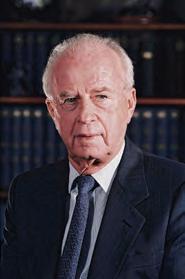



Nov. 5, 1933 — Hebrew U. presents expansion plan
Judah Magnes, the president of the Hebrew University of Jerusalem, opens the academic year by outlining a plan for the university’s expansion, including the hiring of 14 professors ousted in Nazi Germany.
Nov. 6, 1987 — Singer Zohar Argov kills himself
Zohar Argov, who as one of Israel’s first Mizrahi music stars is known as the “The King” but is haunted by drug addiction, accidentally dies by hanging in jail at 32 shortly after being accused of attempted rape. PJC



Rita'sHomeCareAgencyisownedand operatedbyaregisterednurse dedicatedtohelpingseniorsremainsafe andindependentintheirhomesandin theircommunities.
Weareknownforprovidingserviceswith compassion,loyaltyandintegrity. Weprovidenon-medical,in-homecare toseniors,disabledadults,those recoveringfromsurgery,illness,orinjury, oranyonewhoneedshelpwiththe activitiesofdailyliving.Ourtrustworthy rofessionalsprovidepersonalcare andhomemakingservicesinyourhome wheneverneededaroundtheclock,for justafewhours,weekendsandholidays.

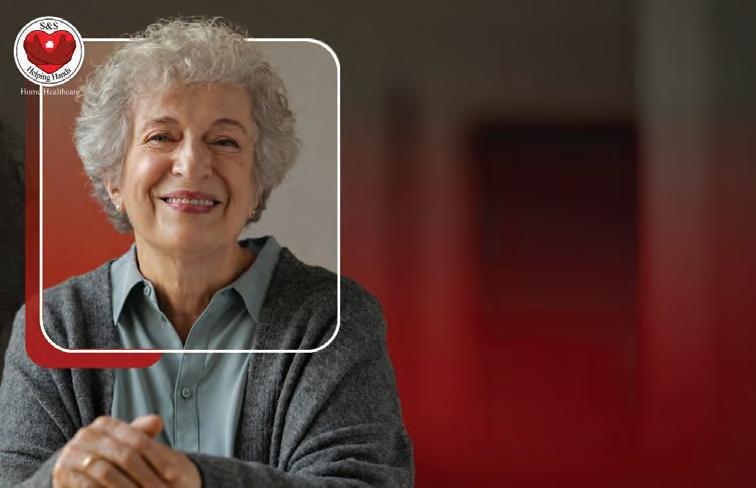



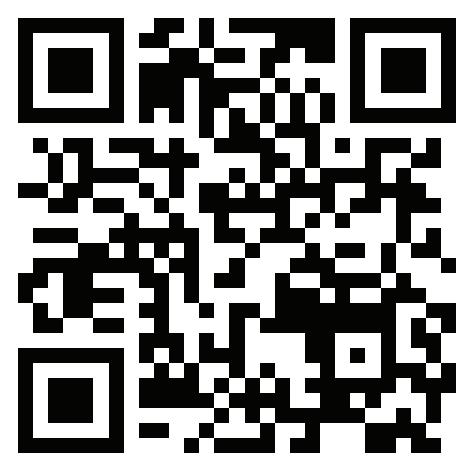
Guest Columnist
Rick Franks

As we come to the end of October, we also close out cybersecurity awareness month. While the internet can be a wonderful tool for seniors to stay connected with family and friends, it is also where older adults are targeted by financial scams and other online threats.
According to the FBI’s Crime Complaint Center, 147,127 people age 60 and over filed complaints in 2024, a 46% increase from 2023. These complaints resulted in losses of over $4.8 billion, 43% more than the year prior and over $2 billion higher than any other age group lost. These numbers show that criminals are increasingly targeting older adults online.
Many of these crimes go unreported because of fear or embarrassment. Scammers use many different methods, including phone calls, texts, emails and pop-up messages to deceive and defraud senior citizens. Below are some of the most common online scams that target older adults:
Personal and emotional scams
• Grandparent scams: Seniors receive calls from someone pretending to be a child or grandchild in trouble and in need of immediate financial assistance. Recordings or
artificial intelligence may be used to mimic a loved one’s voice, making it sound as if they are truly speaking to a family member.
• Romance scams: Fake profiles on dating sites and social media are used to build trust over time. Once a relationship is established, the criminal asks for money and/or personal information.
Impersonation scams
• Law enforcement scams: Callers present themselves as officers from the police, sheriff’s department, or a federal agency and threaten arrest or legal action unless payment is made immediately.
• IRS impostor scams: Criminals impersonate IRS employees through phone calls or text messages, stating their victims owes money to the IRS that must be paid promptly to avoid arrest or other serious penalties.
• Social Security scams: Imposters claiming to be from the Social Security Administration contact their victims via phone call, text and email. They may report that a Social Security number has been suspended, involved in suspicious activity, or linked to a crime, and request confirmation of the number. In other cases, they warn that benefits will stop or the number will be deactivated unless they are paid immediately.
Financial and prize scams
• Investment scams: Offers for “can’t-miss” investment opportunities are presented as limited or time-sensitive, pressuring people to act quickly before the offer expires.
• Sweepstakes, charity, relief funds and lottery scams: You are notified that you’ve won a prize, but are required to pay the taxes, fees and/or shipping cost before you can collect it.
Technology scams
• Tech support scams: Pop-up alerts, emails, or phone calls may warn you of a problem with your computer or phone. These messages often appear to come from well-known companies and may request remote access to your device or pay for unnecessary repairs.
• Toll scams: Texts or calls state you owe unpaid tolls and instruct you to click on a link or call a phone number to resolve the issue.
Home and service scams
• Home repair scams: Scammers go doorto-door, typically after storms, warning that your home needs urgent repairs. They often offer a discount if you pay cash immediately, then take the money and never return or do poor-quality work.
No matter the scam, these common red flags can help you identify fraud:
• Any sense of urgency to act immediately.
• Calls or messages from unknown numbers or people warning that a loved one is in trouble.
• People who say they want to know you better but won’t meet in person or only contact you on their terms.
• Winning a contest or lottery you never entered.
• Pop-up alerts claiming to be from “Tech Support.”
• Unsolicited people showing up at your door.
Tips to protect yourself from scams:
1. Pause before acting. Scams rely on fear and urgency, so take a moment to think about the legitimacy of the request before responding.
2. Confirm identities. If someone claims to be a loved one or an official, hang up and call them back using a verified number.
3. Be cautious about payment methods. Legitimate companies rarely ask for wire transfers, money orders, or gift cards.
4. Never share personal information, like Social Security numbers, passwords, or account numbers with unknown callers or email addresses.
5. Don’t click on links or download attachments in unsolicited emails or texts.
6. Keep your devices updated with the latest antivirus software and malware protection.
Older adults can protect themselves from online scams by staying alert and recognizing the warning signs of fraud. If you or someone you know is scammed, contact your bank to secure your accounts, notify the three major credit bureaus, report the incident to local authorities, and file a complaint with the FBI’s Internet Crime Complaint Center at ic3.gov. PJC
Rick Franks, CPP, FLO, is the security manager and emergency management coordinator at the Jewish Association on Aging.


By Adam Reinherz | Senior Staff Writer
Spirituality in a Squirrel Hill-based rehabilitation center is getting a boost. Greenfield resident Rabbi Shlomie Deren was recently hired as a part-time chaplain at Heritage Care Center.
The role, according to Deren, builds on past efforts.
Before he was hired last week, Deren, 37, volunteered at Heritage and served as a “bridge” between patients, families and care providers. The work, which entails speaking with people, listening and hearing their spiritual concerns, he said, is similar to what he’s been doing voluntarily at several area hospitals.
Both from his time as a citywide volunteer, and during a one-year residency at the VA Pittsburgh Healthcare System in Oakland, Deren noticed several needs in the local caring community.
When a patient leaves the hospital and requires a short-term rehab venue, “there aren’t a lot of facilities in the area,” he said.
Patients seeking assistance often need to travel “further out,” away from Squirrel Hill and the East End — meaning family members are likely “less able to visit, less able to be there to support them.”
The hardship is compounded, he continued, by various religious concerns, including dietary restrictions and Shabbat observance.
“A lot of the facilities are a half-hour, 45 minutes away” in locales without easy access to kosher food, he said. Additionally, when patients are located far from family, it’s difficult for those who observe Shabbat “because these facilities aren’t within walking distance.”
Deren said that although Heritage — which is located on Philips Avenue in Squirrel Hill — lacks a kosher kitchen, kosher meals are available and therefore patients can “focus on their health, on getting better, without having to worry about compromising on their religious or spiritual values while they’re doing it.”
Ari Grinspan, CEO of WeCare Centers, said he’s eager for Deren to begin serving patients and families at Heritage, one of WeCare’s facilities.
“WeCare is deeply committed to ensuring our Jewish residents, and really, all residents of faith, feel supported in both their spiritual and emotional wellbeing,” Grinspan said.
The goal, according to Grinspan, is that the “spiritual care” afforded by Deren will supplement current “resident-cen tered” programming. “In that sense, his involvement complements — rather than overlaps with — the activities
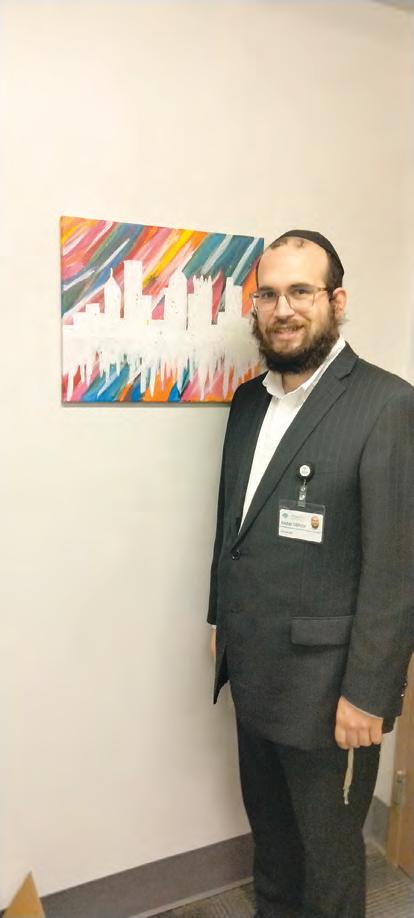




department, helping ensure that both the social and the religious dimensions of Jewish life are meaningfully supported at Heritage.”
Deren said he appreciates the opportunity to not only serve Heritage’s patients and families but demonstrate chaplaincy’s value, as the work is too often lost in the medical system.
A 2011 University of Chicago study found that 20% of patients who wanted to discuss religious or spiritual concerns with someone in the hospital did not have that conversation. Conversely, hospitalized patients who spoke about religion and spirituality with their health care team were most satisfied with their overall care.
The role of a chaplain, Deren said, is to “talk, to listen, to support, to help people work through the spiritual aspects or the spiritual and emotional aspects of what is always a difficult situation.”
Spiritual well-being and treating the “whole person” are important parts of health care, he continued. “I want people to know that I’m available to support them in that aspect of their healing, while the doctors, nurses and therapists are helping them with their physical health.”
Adam Reinherz


Higher Standard of Living aims to help individuals maintain their independence and quality of life in the comfort of their own homes. We are committed to enhancing the well-being and independence of our clients by delivering skilled care. Fostering meaningful relationships and upholding the highest standards of professionalism, integrity, and respect.
Looking for quality care for your loved ones? Schedule a consultation with us!
CONTACT US
Phone: 724-470-3457
Email: Christachandler@hsoliving.com Website: hsoliving.com




Pop quiz! What’s a simple measurement you can do on your own that provides a powerful reflection of your overall health? You might guess vital signs like blood pressure, heart rate, temperature, respiratory rate, or oxygen saturation. Yes, these are all key indicators of how your body is functioning. But what if I told you there’s another measurement that can reveal just as much — if not more — about
your general health? You don’t need any needles, fancy machines, or even any special skills. All it takes is a stopwatch and a premeasured area to track gait speed, or how fast you walk.
Gait speed, or walking speed, is a simple measure of how quickly you can walk a short distance (usually 4 meters, or about 13 feet).
Research shows that this small test can predict a surprising number of health outcomes, including risk of falling, risk of hospitalization, functional decline, cognitive decline, how well you recover after surgery and even mortality risk. A 2011 study in JAMA analyzed data from 34,000 adults aged 65-plus and determined that a slower gait speed was associated with a higher risk of death while a faster gait speed was




associated with a higher survival rate.
Gait speed is such a powerful metric because it reflects the overall function of multiple systems in the body, including muscle strength and coordination, endurance and aerobic capacity, balance, reaction time and cognition and spatial awareness (vestibular system). If one of these systems is lacking, then your walking speed may slow down. Gait speed can be an early sign that something is wrong, even if you don’t feel any other symptoms.
For most adults, normal walking speed is 1 to 1.4 meters per second (roughly 2.2 to 3.1 miles per hour) and is considered a healthy range. Usually the different parameters of gait speed are as follows:
Faster than 1 m/s = independent, good health
Slower than 0.8 m/s = at higher risk of health problems and falls
Slower than 0.6 m/s = may need assistance walking and with daily tasks
As a physical therapist, I see how closely gait speed relates to a person’s independence, confidence and quality of life. If someone is walking more slowly than usual, it may mean they are struggling with weakness, pain or fatigue. By addressing each aspect of gait speed and the actual gait speed itself, we can make a big difference in someone’s quality of life. Improving gait speed, even just a little, can lead to major improvements in mobility, safety and daily functioning. This can make the difference between someone feeling left out and being able to keep up with their grandchildren and family during an outing.
You can improve your gait speed by making small changes in lifestyle. First, walk more often!

Aim for short, brisk walks throughout the day. My rule of thumb is to walk 10 min for every hour you sit. Set a timer if you are watching television, and get up every hour. Sitting for long periods causes muscles to get weak.
Second, make sure that you strength train. During each decade after our 40s, we lose a percentage of muscle mass naturally. Sedentary lifestyle and inactivity can compound those effects over time. Focus on legs, hips and core to improve your gait speed.
Next, practice balance. Just like strength, balance can be improved over time. Stand with your feet together — or even on one foot. Practice walking like you are on a balance beam or with your eyes closed.
Make sure you stay mentally engaged by challenging your brain with puzzles, reading or cognitive tasks.
Finally, see a physical therapist if you feel unsteady, slow or have pain. A PT can help to identify the root cause and create a personalized plan.
Gait speed is more than just a number — it’s a reflection of your body’s overall performance. It’s quick, easy to test and incredibly informative. So next time you’re wondering how you’re doing health-wise, don’t just check your pulse — check your pace. And if you notice that you’re walking more slowly than you used to, don’t ignore it. Talk to your doctor or physical therapist. After all, your walk could be telling you something important. PJC
Jessica Neiss owns To Life! Therapy & Wellness which offers PT, OT and speech for older adults and people with neurological disorders. She has been a physical therapist for 23 years.








By Family Features
As the cost of living continues to rise, many Americans are being forced to make difficult financial decisions. Skipping medications might seem like a quick way to save money, but this can lead to serious health risks and higher costs down the road.
In fact, research shows 27% of Americans skip prescriptions each month due to cost. More than half of Americans who filled a prescription this year said the cost felt like a financial burden.

Cindy George, MPH, a senior personal finance editor at GoodRx and nationally recognized health journalist, shared expert advice to help consumers improve their health care cost literacy, reduce expenses and stay healthy without overspending.
Understand the true cost of medications
Many people assume the pharmacy counter price is non-negotiable, but the cost of the same medication can vary significantly.
“Costs can vary by upwards of $100 from
one pharmacy to the next, even in the same ZIP code,” George said. “Understanding how to compare prices and find the most affordable option is incredibly valuable.”
By entering the medication name, along with dosage and ZIP code, individuals can quickly compare prices in their area using GoodRx. Using the website or app, you can explore alternative forms of a medication and get suggestions to help you talk with your doctor or pharmacist about more affordable options.

Medicare felt overwhelming—dozens of plans, endless forms, and no clear path. Then we met with Stephanie. She was calm, caring, and incredibly knowledgeable. She guided us to a plan that fits us both—and it’s been fantastic. We’re so grateful we found her.
— IRIS & PHIL SAMSON
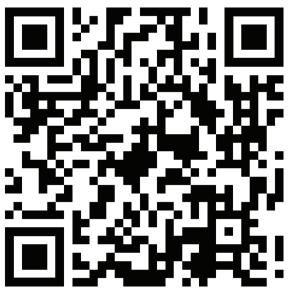

Providence Point — a stress-free home where you can meet new friends, discover hobbies, and enjoy various dining options, innovative wellness programming, and interesting events. Experience your new home that gives you more from life — and gives your family peace of mind.
Providence Point — a stress-free home where you can meet new friends, discover hobbies, and enjoy various dining options, innovative wellness programming, and interesting events. Experience your new home that gives you more from life — and gives your family peace of mind.
Call 412-489-3550 or visit www.ProvidencePoint.org and experience life uplifted today.
Call 412-489-3550 or visit www.ProvidencePoint.org and experience life uplifted today.


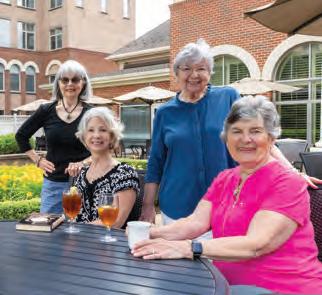

500 Providence Point Boulevard, Pittsburgh, PA 15243
500 Providence Point Boulevard, Pittsburgh, PA 15243
www.ProvidencePoint.org
www.ProvidencePoint.org

Continued from page 13
When insurance falls short, you still have options
Only about half of prescriptions are fully covered by insurance without restrictions.
“Even insured individuals are struggling to keep up with health care costs,” George said. “More are finding themselves underinsured, and that’s making basic health care harder to afford and access.”
That’s why comparison shopping is increasingly important, including price comparisons at different pharmacies.
“Cost comparison tools can help people find lower prices on both generic and brand-name medications, regardless of their coverage status,” George said.
While cost comparison tools are not a full replacement for health insurance, they can be a helpful way to reduce medication costs and avoid unexpected surprises at the pharmacy.
confidence
Cost literacy involves understanding how insurance works, what’s included in a plan’s formulary, how to interpret billing documents and how to challenge costs that seem too high. According to George, “health care cost literacy” is one of the best investments you can make in your financial well-being.
“Tools like the GoodRx Guide to Drug Costs, Coverage and Savings, cost estimators from hospitals and insurance plans and

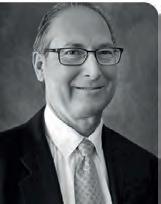
State Health Insurance Assistance Programs can help you better understand and manage costs,” she said. “If something is unclear, don’t hesitate to ask your provider, pharmacist or insurance representative to walk you through your bills or Explanation of Benefits.”
Simple strategies can add up George recommends a few strategies that can reduce out-of-pocket costs for medications:
• Always compare prices, including your insurance copay. “People assume their insurance is the best deal for accessing a medication at the lowest cost, but that’s not always true,” George said.
• Uncover savings programs. Many pharmaceutical companies offer copay cards or patient assistance programs that can dramatically reduce costs.
• Explore generic medications, if available. Generic medications typically cost less than their brand-name counterparts. Check with a health care professional before opting for a generic.
• Consider a 90-day supply. For chronic conditions, ask your health care professional whether you can switch from a 30-day supply of medication to a 90-day supply.
• Try delivery. Ordering through a mailorder pharmacy can add convenience and, in many cases, offer lower prices.
Visit GoodRx.com to compare prices and take more control over your medication costs. PJC
Could you benefit from a list of tips and suggestions for estate and legal planning? If you become disabled, absent or unavailable due to illness, or even passing on, your advance planning can help your family to deal with the resulting challenge, and handle or wind up your affairs more efficiently. These planning suggestions are general in nature, however. Consult a reliable elder law or estate planning attorney for individual advice.
Review and make a list of the assets that you own, paying particular attention to how each asset is owned and titled, and how beneficiaries are named. Is an asset owned by you in your name only, or as a joint account, or an “In Trust for” account? Have you named pay-on-death beneficiaries on your insurance and retirement plan accounts? Also review and list debts, ongoing expenses and tax issues, and how your bills are paid, so someone else can handle payments if you become unavailable.
Gather and organize your financial and legal records and documents. Tell someone where to find your planning materials when needed.
Decide WHO will help you with financial or healthcare matters, as your Agent under Power Of Attorney, Healthcare Agent, Executor or Trustee, if or when you need help. Deciding who will help you is just as important as deciding how you want them to handle your affairs, or who will inherit from you. Choose someone whom you know and trust make good decisions for you – and don’t forget to name an alternate or backup or substitute, too, in case your first choice is also not available.


NOTE: NEW SQUIRREL HILL OFFICE LOCATION TO BE ANNOUNCED SOON! mhm@a-h.law NEW FIRM MAIN OFFICE 3960 William Flinn Highway (Route 8) Allison Park, PA 15101 10 minutes closer to town! (412)486-6624
Create standard estate planning documents:
• A Health Care Power Of Attorney with Living Will (Or Advanced Directive),
• Business and Financial Power Of Attorney,
• Last Will and Testament, and/or
• Revocable or Irrevocable Trusts
• Deeds, business transfer documents, etc as needed.
Plan especially for Guardians and Trustees for minor children, and provide for minor children - and young adult beneficiaries too - with Trust arrangements, in care of someone in whom you have confidence – someone you trust – to assist them.
For beneficiaries with special needs due to disability, plan and provide specially e.g. via Special Needs Trusts, ABLE accounts etc. A special needs family member with a disability may need and rely on Medicaid to pay big medical bills, for example. If so, assistance from you in the form of a gift or inheritance, must be done right to avoid interfering with their eligibility for benefits that are based on financial need.
For aging seniors, consider an Irrevocable Asset Protection Trust to safeguard a portion of your wealth against the potential cost of your own long term care, after five years has gone by (so start this approach sooner instead of later).
Consider long-term care insurance as protection against the potential cost of long-term care, to see if it is right for you. Maximizing the efficiency of this strategy depends on good timing as well, i.e. better begun not too late, and when you are not too old, or it’ll cost more.


Consider tax implications of your estate plan, tax aspects of who will benefit from you, and how gifts and inheritances will be structured.
Concerning your healthcare, make a list of your doctors, prescriptions and diagnoses. Review your own health insurance coverage.
Consider instructions about donating organs or tissues, perhaps just for transplants to help another individual, or more broadly for medical study or education. These provisions are usually part of your Living Will or Advance Healthcare Declaration
Communicate your funeral plans and preferences, or plan the funeral yourself (and possibly prepay).
Organize your passwords and information about your online and digital accounts and access, and store securely. The question of how to store this information securely for someone else is complicated, though.

Make a record of your work history, especially with regard to life insurance or pension benefits, and for calculating your full Social Security amount.
Make a business succession plan if you are a business owner, including for interim operations if you become suddenly absent.






Commemoration:
Continued from page 1
The traditional Prayer for Our Country was recited by Paul Hilterbrick, Keith Stewart and Darren Cook, members of the Pittsburgh security community. Amy Mallinger and Steven Wedner, grandchildren of Rose Mallinger, read the Prayer for Peace — the same prayer Mallinger led for the Tree of Life Congregation each Shabbat.
Concluding thoughts were offered by Frederick, Maryland, Police Department Chief Jason Lando. Lando previously served as a police officer for 21 years in Pittsburgh and was the incident commander during the response to the Oct. 27 attack.
Lando’s connections to the Jewish community are deeper than that of most first responders called to action that day. He is Jewish, grew up in Squirrel Hill and attended Tree of Life.
The police chief spoke of his grandfather, a Tree of Life member who typically attended Shabbat services. He missed services the day of the attack because he wasn’t feeling well.
“Oct. 27 is a date that Pittsburgh will never forget,” Lando said. “It is a wound in our heart, a break in the fabric of our lives and a day that redefined what it means to be a part of the Tree of Life and, more broadly, a member of the Pittsburgh Jewish community.”
He said those murdered weren’t simply victims, but were parents, siblings, friends, neighbors and pillars of the community.
Students:
Continued from page 1
The pain, Hausman said, of losing beloved congregants will never be forgotten, but the “real story of how we survived, and how everyone got through this,” is told in two words: “stronger together.”
Hausman credited faith leaders across Pittsburgh with lending physical space and emotional support in the aftermath of the shooting.
“It’s a long road to recovery. There is no magic switch. There is no magic saying. It’s just day by day,” Hausman said.
Lando recalled when the initial call came in reporting the attack, which he believed to be a “cruel joke.” Only after asking the 911 center how many calls came in about Tree of Life, and learning that it was “flooded” with calls, did he begin to reckon with the gravity of the situation and the reality that his grandfather was most likely in the building.
“During this time, the land is left to rest, certain agricultural activities are forbidden, and it is a year of remission of debt. It is also a time to bring awareness to the burden we carry in many aspects of our lives,” she said.
Feinstein told the Chronicle there is a purpose to remembering tragic events.
“Carving out this one small window where
"We are still working to ensure that no community, Jewish or otherwise, faces such terror again. The work is hard, and it can feel endless, but it is important.”
–JASON LANDO
Remembrance, Lando told those in attendance, isn’t only about looking back.
“It’s also a commitment to move forward with purpose. Seven years later we are still fighting the hate that led to the attack. We are still working to ensure that no community, Jewish or otherwise, faces such terror again,” he said. “The work is hard, and it can feel endless, but it is important.”
The 10.27 Healing Partnership, led by Maggie Feinstein, organized the ceremony with a working group dedicated to planning the event. Feinstein closed the commemora-
we can put our focus is incredibly healthy for the rest of our lives,” she explained.
The 10/27 commemoration, Feinstein said, is like the anniversary of Kristallnacht, where we remember a specific horror.
“It allows us to look at other things in the world in a different lens,” she said. “I feel that same way about 10/27, especially for our local community. Holding out and carving out the space of remembrance is really important. It’s a place where we can put that emotion and keep going in a world with many other things going on.”
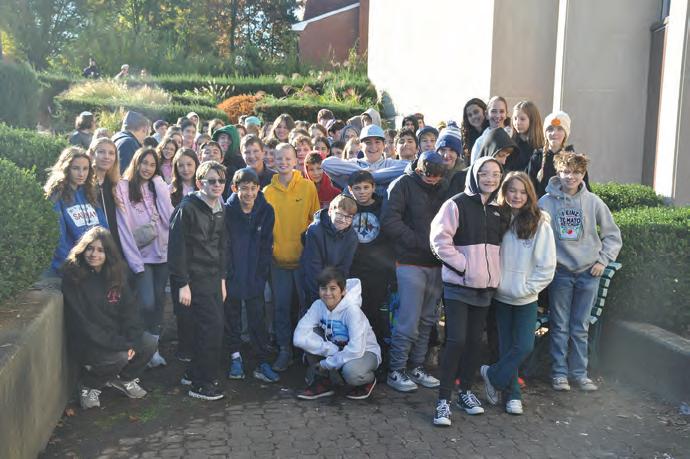
With sun shining down on the adolescents, Andrea Wedner read the names of the 11 people — Joyce Fienberg, Richard Gottfried, Rose Mallinger, Jerry Rabinowitz, Cecil Rosenthal, David Rosenthal, Bernice Simon, Sylvan Simon, Dan Stein, Irving Younger and Melvin Wax — who were killed seven years prior.
Wedner, a survivor of the attack who also lost her mother, Rose Mallinger, in the shooting, paused after each name for students to light a memorial candle.
Jay Leberman, Mandel’s head of school, recited Kaddish, a 13th-century Aramaic prayer that ends with a request for absolute peace.
Invoking that divine appeal, students from both Jewish schools sang the text’s concluding words.
Most of the participating students were 12
or 13 years old, and likely have no memory of the Pittsburgh synagogue shooting. Still, it’s essential to travel, recall and make new memories, Leberman told the Chronicle.
“It’s critically important that our students — especially coming from Cleveland — understand that this is something that we’ll never forget and we can’t forget,” he said.
Crediting Hausman with mentioning those who helped Jewish Pittsburghers in the aftermath of the attack, Leberman said students need to know the “world is made up of more goodness than evil.”
The program, which was part of a daylong visit between students, was about “transforming memory into connection and purpose,” Casey Weiss, CDS’ head of school, told the Chronicle.
Following the morning commemoration, students traveled by bus to the JCC’s Henry
first responders and spiritual leaders, as well as many elected officials, including City Councilperson Barb Warwick, City Controller Rachael Heisler, former Allegheny County Executive Rich Fitzgerald, Mayor Ed Gainey, Allegheny County Executive Sara Innamorato, State Rep. Dan Miller, U.S. Rep. Chris Deluzio, State Supreme Court Justice David Wecht and Sen. John Fetterman.
And while many chose to remember the Pittsburgh synagogue shooting through the commemoration ceremony or by taking part in volunteer opportunities offered on Oct. 26, the anti-Zionist organization Jewish Voice for Peace used the day as an opportunity for self-promotion.
As the wider Jewish community marked seven years since the antisemitic attack, JVP filmed its members outside the Israel Bonds office, delivering a petition signed by fewer than 4,000 people — less than 1% of the population of greater Pittsburgh and less than .03% of the state’s population — calling on Pennsylvania to “divest from genocide, war, and apartheid and invest in our communities by sunsetting the state’s investment in Israel Bonds.”
Despite JVP’s attempts to divert attention from the 11 victims of the Pittsburgh synagogue shooting, the commemoration ceremony served as an apt reminder that, as Feinstein said as she closed the event, “There’s far more good in the world. May we continue to live faithfully.” PJC
The event was attended by hundreds of community members, including several
David Rullo can be reached at drullo@ pittsburghjewishchronicle.org.
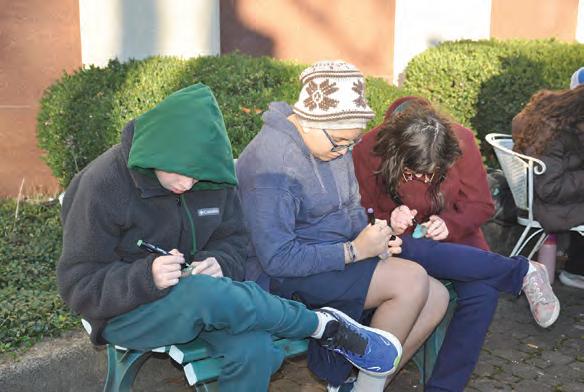
Kaufmann Family Park in Monroeville for hours of activities, including a scavenger hunt, zip lining and discussion.
The goal, Weiss said, was for adolescents to gain an appreciation of the wider Jewish world.
Students should “see themselves as part of something bigger,” she said. “By connecting with peers from another city, our students experience, firsthand, that Jewish life spreads beyond just their circle of peers or local Jewish connections.”
Ron Wedner, who joined his wife, Andrea Wedner, at the morning commemoration told the Chronicle that young people — especially — must understand the lessons of Oct. 27.
As a lead-up to the communitywide commemoration at the JCC, and as an outgrowth of the Eradicate Hate Global
Ron Wedner spent months working with high school students in several districts, including Mt. Lebanon, North Hills, Northgate, South Allegheny and South Fayette.
Those students — most of whom are not Jewish — designed panels and boards demonstrating the “initiatives they’ve taken, and the programs they put together, in their schools that draw students and help fight bullying, bigotry and racism.”
Engaging young people of all backgrounds is vital for collective growth and improvement, Wedner continued.
“These kids are just trying to promote kindness, tolerance and acceptance,” he said. “That’s important to us.” PJC
Adam Reinherz can be reached at areinherz@pittsburghjewishchronicle.org.
Guest Columnist
Michael E. Lowenstein
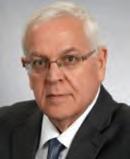
Nov. 4 is Election Day in Allegheny County and throughout Pennsylvania. Even though 2025 is an “off-year” election, Pennsylvania voters have important choices to make. The election attracting the most interest, both in Pennsylvania and nationally, is the retention election for three Pennsylvania Supreme Court justices: Justices Christine Donohue, Kevin Dougherty and David Wecht. Two of these justices, Donohue and Wecht, are Pittsburghers; Wecht also is a prominent and respected member of our Pittsburgh Jewish community.
This election is critical to the future of this country. I urge you to read the back of the ballot, where the retention election appears, and to vote “Yes” to retain Justices Donohue, Dougherty and Wecht.
Under the Pennsylvania Constitution, state Supreme Court justices are elected to 10-year terms. After that, they are subject to “retention elections” every 10 years until they retire, which is mandatory at age 75. These are “Yes or No” elections — there is no opposing candidate, and justices are not listed as Democrats or Republicans. Justices receiving more “Yes” votes than “No” votes receive another 10-year term, subject to retirement (or impeachment or removal for misconduct) before then.
If a justice were to receive more “No” votes than “Yes” votes, the governor (currently Democrat Josh Shapiro) would appoint a successor, subject to the advice and consent of two-thirds of the Pennsylvania State Senate (currently majority Republican.) If the state Senate did not confirm the governor’s appointment, the Supreme Court seat would remain vacant until filled through an election in 2027.
As the administrative office of the Pennsylvania Courts explains: “The intent is to provide a fair and nonpartisan way for the public to judge its judges.”
The challenge to retention of the three Pennsylvania Supreme Court justices
Typically, Pennsylvania Supreme Court justices have been retained by wide margins in elections to which little attention has been paid. It has been 20 years since a Pennsylvania Supreme Court justice lost a retention election. This year, these retention elections are an extremely big issue. Despite the nonpartisan design of the retention election process, there has been a very active and well-funded partisan effort by conservative groups and the Republican Party to urge voters to vote “No.”
In turn, there has been a vigorous response urging voters to vote “Yes.” Gov. Josh Shapiro strongly supports the retention of these three justices, citing the protection of freedoms and a woman’s right to abortion and birth control. While Shapiro is a Democrat, the non-partisan Pennsylvania Bar Association also recommends retaining Justices Donohue, Dougherty and Wecht.
Opponents of retention have argued that a 10-year retention term is undemocratic and that a “No” vote is needed to create “term limits.” However, they are not seeking to change the retention election rules in Pennsylvania. They just do not want these three justices, originally elected as Democrats, to be retained. Voting “No” on retention of these three justices would not amend the retention election rules in the Pennsylvania Constitution and would not create term limits.
Furthermore, the retention election already is a democratic process; by contrast, federal judges are appointed for life.
The New York Times recently stated (Sept. 16):
“What’s at stake is nothing less than control of the highest court in the most important swing state in the country.” As the Times noted, these three justices have played an important role in Pennsylvania Supreme Court election law decisions: “In 2018, all three Democratic justices up for retention voted to knock down the state’s congressional map as an unconstitutional gerrymander. In 2020, the Democratic justices ruled that ballot dropboxes were permitted in the state. And in 2022, the justices upheld the state’s mail-in voting law.”
If the three justices are not retained, and with the Republican-controlled state Senate having veto power over replacements, the composition of the Pennsylvania court would be fundamentally altered in advance of the 2026 election. The court likely would go from a 5-2 majority of justices originally elected as Democrats to a 2-2 split.
In normal times, there would not be any serious challenge to the retention of any of these justices, much less all three of them. Justices Donohue, Dougherty and Wecht are experienced judges. Each served for many years on other courts before earning election to the Supreme Court, and, as the non-partisan Pennsylvania Bar Association noted, each has served with distinction on the Pennsylvania Supreme Court.
These are not normal times. We are facing an intensive effort to remake our national government, to repose power in a president and an executive branch that is far less constrained than in the past by the legislative and judicial branches. The administration also appears committed to an executive branch — including the Department of Justice, the FBI, ICE, the military and regulatory agencies — loyal to and controlled by the president.
The forces attempting to make these fundamental changes currently control the presidency and both houses of the U.S. Congress, and, on many key issues, have been aligned with the views of a majority of the U.S. Supreme Court. Accordingly, the executive
Guest Columnist
Rebecca Mayer
Ibranch’s aggressive agenda has proceeded largely unchecked.
This absence of checks and balances would be deeply concerning regardless of which party controlled the levers of power. Removing these three Pennsylvania Supreme Court justices would remove one more vital check and balance.
The elections of 2026 and 2028 are crucial to the future of the country. Elections are how the people express their political will and hold political leaders accountable. Whether or not you believe, as I do, that the radical authoritarian changes this administration is seeking are an existential threat to our country, it is essential that we have free and fair elections in 2026 and 2028 (and beyond) so that we, the people, can choose the direction of our country.
Preserving free and fair elections also is a Jewish issue. Authoritarian countries without free and fair elections, whether left or right, have not gone well for Jews, to say the least. In the richest Jewish tradition, we could debate whether electoral democracy is a “Jewish” concept, as we debate virtually everything else. But that tradition of debate itself reflects the core Jewish value of respectful and thoughtfully reasoned disagreement, a core value in line with having our disputes resolved at the ballot box and by able judges, rather than by the exercise of raw power. Likewise, it is a core Jewish value to stand up through lawful means for anyone oppressed by the wrongful exercise of raw power.
Pennsylvania will be a critical state in these elections, as it always is. The Pennsylvania Supreme Court has been a bulwark to ensure that Pennsylvania elections remain free and fair. To ensure that this crucial bulwark is preserved, please vote “Yes” to retain Justices Donohue, Dougherty and Wecht. PJC
Michael E. Lowenstein is an attorney living in Pittsburgh.
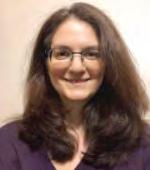
n response to a call by Israeli human rights activists for international volunteers, I traveled to Israel from Sept. 14–24 to participate in protective presence efforts. Protective presence involves the placement of Israeli and international citizens in vulnerable Palestinian communities in order to deter and document illegal settler violence. Since the current Israeli government coalition came to power in December 2022, the West Bank has experienced a sharp increase in settler attacks. More than 50 Palestinian communities have been driven off their land according to Kerem Navot, an Israeli civil society organization; dozens more are on the verge. My field work was
organized by Torat Tzedek, an Israeli human rights organization founded by Erie native Rabbi Arik Ascherman.
Settler efforts to expel a community often start with the establishment of an illegal outpost by “hilltop youth” in the vicinity of the target. This is followed by encroachment on Palestinian property to graze settler flocks. The harassment escalates with verbal abuse, property damage, beatings and occasional killings, until the community decides it is too dangerous to stay.
Over the course of my trip I alternated through four Bedouin communities in the West Bank: Mukhmas, East Taybeh, Duma and Jaba. The Bedouins are a distinct ethnic group making up about 10% of the Arab population in Israel and less than 2% of the population in the West Bank. Their cultural heritage is one of nomadic pastoralism, and many families continue to base their livelihoods on sheep and goat herding. Originally from the Negev region around Beersheba,
some were displaced to the West Bank during Israel’s 1948 War of Independence.
On my first day in the field, I was stationed in Mukhmas with another American activist when we started to get urgent reports of a settler attack a few towns over in Taybeh.
Neriya ben Pazi was reported to be there with 20 settlers throwing stones, beating residents and stealing sheep. Ben Pazi is a well-known instigator of the settlers’ ethnic cleansing strategy. He was put under sanction by the Biden administration, who described him as a “violent settler activist” responsible for having “expelled Palestinian shepherds from hundreds of acres of land”.
An elderly man named Yousef, the patriarch of a large shepherding family in East Taybeh, was severely beaten and his wife was also injured. One of his neighbors, Falah, was also attacked and robbed. (Falah was a refugee from Mughayyir al-Deir, a nearby Bedouin settlement whose expulsion was completed following a large settler attack
only a few months earlier in May 2025.) The Palestinian ambulance that came to retrieve Yousef and the other injured was blocked by Israeli forces for about 90 minutes, during which time the settlers pelted it with rocks.
I spent a lot of time with Yousef’s family while he was hospitalized. This was a large family including the grandparents, adult sons, their wives, and their toddlers and young children. They lived in partly open shacks with intermittent electricity, water tanks and very rudimentary sanitation. Just down the hill were the animal pens for the sheep — empty by the time I got there after the theft. Despite the poverty, the children I saw were happy and playful, growing up with their extended family and cousins within arm’s reach. I brought a little squeaker ball to play with, and the kids were delighted. After a few tosses it bounced away, and the games
Please see Mayer, page 17
Last week, the Chronicle asked its readers in an online poll the following question:
“Do you believe antisemitism in the U.S. will decrease following the ceasefire agreement between Israel and Hamas?” Of the 329 people who responded, 2% said, “yes, significantly”; 13% said, “yes, somewhat”; 53% said, “no change”; 28% said, “no, it will increase”; and 4% said they were unsure. Comments were submitted by 86 people. A few follow.
The lack of reaction and support from the “pro-Palestinian” camp for the ceasefire is deafening. The violence and killings that Hamas is perpetrating against other Gazans is not being condemned. All of this shows that this is very much a Jew-hating phenomenon.
The ceasefire has already been broken, and we have a president whose hateful actions and language has brought hatred out into the open and an acceptable form of behavior.
I was happy about the peace agreement and President Donald Trump’s hard work. Also, I’m worried that Hamas will still attack and kill Israelis.
I hope so, but the minute Israel revolts against aggression, we become the enemy again.
Continued from page 16
shifted back to the usual entertainment, like filling empty paper tea cups with dirt.
We spent a lot of time in the immediate aftermath of the attack figuring out exactly what had happened. Some accounts said dozens of sheep were stolen; others said it was 250. The theft of the sheep was recorded on video; you could watch it on Facebook within a day of the events. The exact number of sheep wasn’t important for legal purposes, since there was no chance the Israeli authorities would investigate and retrieve them, even though the identity of the settlers who took them was widely known. A few months earlier, in May 2025, an Israeli activist I met in the field was beaten by settlers during the expulsion of the community of Mughayyir al-Deir. The police closed the investigation into the incident with no arrests, even though the activist provided the name of one
ceasefire agreement between Israel and Hamas?
People who have blamed Israel for their antisemitism needed a reason to hate us. They will just find another reason. If there isn’t one, they will create one. We are and will remain their emotional scapegoat.
It may increase or existing antisemitism will continue to be normalized and expressed. Things are not looking good.
attacker, photos of others and access to the location app on his stolen laptop.
My presence in Bedouin Taybeh, and that of the other activists, provided a small sense
If it holds, and begins the process of long-term negotiation and change, then I think it will impact the level of antisemitism. If not, I don’t see much change in that regard.
A ceasefire agreement made with a terror organization isn’t worth the paper that Trump signed. There is still too much acrimony, there is too much division and there is way too much propaganda. Many right-wingers want Israel so they have somewhere to send us; others want to appease the 18% of our country who religiously believe Jews have to live there. The left-wingers will hate us even more because they believe what they read. And we (Jews, Americans, Israelis) are not doing a good enough job of defusing the situation, much less getting actual facts out there.
Yes, if the ceasefire holds, and if some kind of more permanent peace that’s reasonably just for Palestinians follows. The Palestinian situation is a main driver of much (not all, of course) recent antisemitism. Successfully resolve the issue and the rationale/ justification for that breed of antisemitism goes away. The ceasefire will likely have little or
or overnight shifts at the compound to watch for any return by settlers and document their activities. The family always wanted us to stay the night, but we often didn’t have
One of the most unexpected and gratifying aspects of the experience was the opportunity to build relationships with the other volunteers and activists.
of security and support as the family dealt with the shock and economic devastation of the attack. Rav Arik and his Israeli and international volunteers helped the family interact with the police, file a theft report and continue to monitor settler trespass. Groups of at least two activists would spend daytime
In times of crisis, community kindness makes all the difference
To follow up on last month’s article “Displaced by fire, Squirrel Hill woman finds strength in faith and community” (Sept. 19), another Jewish community member has been significantly helped by the ongoing and significant generosity of individuals and nonprofits among us. In the midst of the High Holidays, a very ill woman was about to become homeless. The Jewish Assistance Fund and Howard Valinsky were heroic in their assistance to prevent this. Very quickly, and as a Jewish holiday was about to begin at sundown, the Jewish Assistance Fund approved funding for the woman’s move and a new assistive medical device. Howard
enough volunteers to be there 24/7, given all of the other communities facing the same risks that needed presence.
One of the most unexpected and gratifying aspects of the experience was the opportunity to build relationships with the other volunteers and activists. I was surprised to
no effect on the most dangerous form of antisemitism: white supremacy.
Once the remaining 13 souls are returned, the sympathy will end, and the new pictures of Gaza will only increase the antisemitic social media. Unless Israel spends more on fighting Facebook and Twitter we will never win the war.
The trend is growing. Just look at NYC’s mayoral contest.
In the last 10 years, antisemitism has flared when the Israel-Palestine conflict flared. So it will settle down for now. Still, we see in the ADL stats that the 10-year progression has been steadily up. Antisemites from both left and right continue to feel emboldened, in part by the political climate. PJC
— Compiled by Toby Tabachnick
Chronicle weekly poll question: In evaluating Zohran Mamdani’s record regarding antisemitism, how important is a candidate’s past rhetoric versus their more recent rhetoric? Go to pittsburghjewishchronicle.org to respond. PJC
discover that volunteers with Torat Tzedek and other field organizations were motivated by a wide variety of political and religious backgrounds. There were Israeli citizens and internationals; secular, Reform and Modern Orthodox Jews as well as non-Jews; Zionists and anti-Zionists; one activist who had fled to Israel from persecution in their home country; and veteran Israeli activists — one of whom, I later discovered, had fought in the 1973 Yom Kippur war. The long, mostly boring hours we spent stationed in different communities left a lot of time for interesting, respectful conversations. I’m glad that volunteering with Torat Tzedek gave me an opportunity, in a very concrete and interpersonal way, to work for a vision of Israel that opposes the acts of violence and brutality that dominate the international media in these times. PJC
Rebecca Mayer is a data scientist based in Pittsburgh since graduate studies at Carnegie Mellon University in 2008.
Valinsky secured a residence despite significant barriers. His family and staff also assisted in the following days.
I cannot overstate the greatness of the mitzvot that were done to help a person in a time of crisis. This community is lucky to have generous sources of tzedakah and chesed in our midst. Sincere thanks to all of them.
We invite you to submit letters for publication. Letters must include name, address and daytime phone number; addresses and phone numbers will not be published. Letters may not exceed 500 words and may be edited for length and clarity; they cannot be returned. Send letters to: letters@pittsburghjewishchronicle.org or Pittsburgh Jewish Chronicle, 5915 Beacon St., 5th Floor, Pittsburgh, PA 15217. We regret that owing to the volume of correspondence, we cannot reply to every letter.
By Jessica Grann | Special to the Chronicle
This soup has been a fall staple at my home for as long as I can remember.
It’s beef-based, but not as heavy as a stew. It’s filling yet light, and the broth is on the clear side, tinted slightly red because of the tomatoes. I use salt and pepper and a bit of beef consommé to add flavor.
This is a simple recipe allowing the vegetables to take center stage. If you can’t tolerate strong spices or flavors, this is a good choice.
This recipe also is flexible — generally, you can use fresh, frozen, or canned vegetables, although I recommend frozen green b eans rather than canned beans. You can add zucchini or omit the cabbage or corn. It’s a good way to use up extra vegetables you have on hand.
I don’t usually suggest “diet recipes,” but when I’m watching my calories I really enjoy this soup. I can have two bowls and a small piece of bread and feel full until my next meal.
The beef adds some protein and flavor, but the vegetables are the bulk of the soup. If you want to serve this with barley or egg noodles, prepare them separately and add them to each bowl when serving.
I make a large pot of this soup because it keeps for five days in the refrigerator and also freezes well.

Ingredients:
1 ½-2 pounds beef stew meat
2-3 tablespoons olive oil
2 cups yellow onion, diced
3-4 cloves garlic, peeled and sliced
2 cups celery, diced
2 cups Yukon gold potatoes, peeled and diced

Place a large soup pot over medium heat to warm for a few minutes.
Add the olive oil and brown the meat, stirring every 2-3 minutes to get all sides, for 8-10 minutes in total.
Add the chopped onion, carrots, celery and garlic to the meat and cook for 5 minutes before adding the tomatoes (don’t drain if you’re using canned) and 16 cups of water, with 2 tablespoons of sea salt and the whole peppercorns.
Bring to a boil, then reduce the heat, cover the soup and simmer for 1 hour, which will create the broth base. This is a good time to taste the broth, which will be mild but should have some flavor. If it needs more flavor, add low sodium beef consommé powder to taste. Start with 1-2 tablespoons of low sodium powder.
Add the potatoes, cover and let cook for another 20-25 minutes or until the potatoes are fork- tender.
Add the green beans, corn and cabbage last; cover and simmer for about another 20 minutes.
2 large tomatoes diced or 2 cans
tomatoes, undrained
¼ to ½ of a large cabbage, chopped 2-3 cups carrots, sliced
2 cups green beans, fresh or frozen
2 cups corn, fresh or frozen, or 1 can of corn, drained
16 cups water
2 tablespoons sea salt
10 black peppercorns
Beef bouillon powder for flavoring
Salt and pepper to taste
Directions:
Stew meat often comes in pretty large pieces so I usually cut the pieces in half to ensure that every bowl has several bites of beef.
If you need to add more water, add enough just to cover the vegetables. Fresh vegetables may need a little more time to cook than frozen or canned.
I like the vegetables to be tendercrisp upon the first serving. When you don’t overcook the vegetables they maintain their bite even after several days in the fridge.
If the broth is flavored well but is a little too watery, add a few more tablespoons of olive oil for richness.
Add sea salt and fresh ground black pepper to taste.
Enjoy and bless your hands! PJC
Jessica Grann is a home chef living in Pittsburgh.










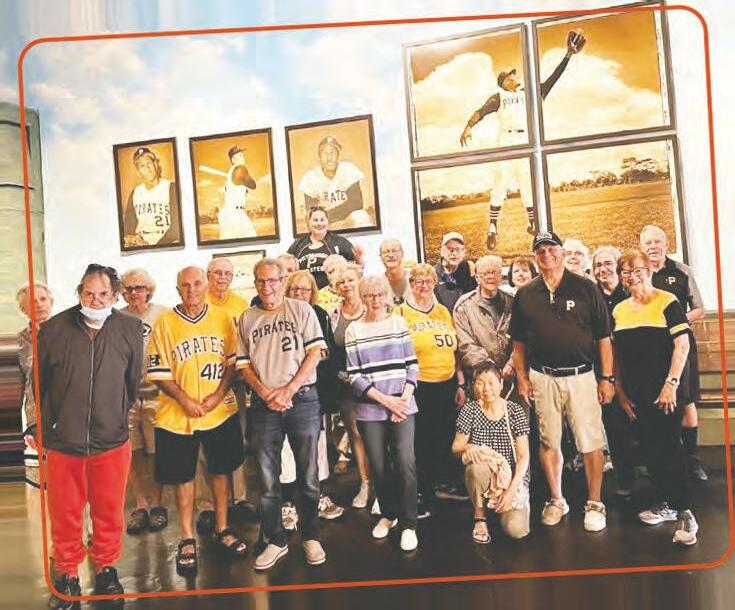














AJCCorparticipatinghealthinsurance planmembershipincludes:
•Fitnessprogramsincluding
SilverSneakersclasses,aquaticexercise, TaiChi
•Cardioandstrengthtrainingequipment, groupexclasses,personaltraining, walkingtrack
•Pickleball
AnAgeWellmembershipincludes:
•JCafélunches
•Socialandeducationalprograms
•Informationandreferralservices
•Volunteeropportunities
AgeWellmembershipisoffered atnocostforresidents
ofAlleghenyCountyovertheageof60
Stopbyorgiveusacall
SquirrelHill:412-697-3514
SouthHills:412-278-1795
OfficehoursMonday-Friday9am-5pm


filmmaker behind ‘Torn’ says his documentary about NYC’s poster wars remains sadly relevant
By Philissa Cramer | JTA
What caught Nim Shapira’s eye when videos of New Yorkers tearing down posters of Israeli hostages began circulating in October 2023 wasn’t just the stark affront. It was also the poles the posters had been attached to.
“I recognized every corner,” he said. “This was my neighborhood.”
The filmmaker had never before turned his craft to his identity as an Israeli living in New York. But Shapira immediately began gathering footage about the posters — and about those who felt compelled to put them up, and to tear them down.
His resulting documentary, “Torn,” was first released last year, when about 100 Israelis were still held hostage, out of roughly 250 taken on Oct. 7, 2023. Now, with all living hostages released and Hamas agreeing to free the bodies of 28 deceased hostages, too, Shapira — who is entering “Torn” into awards consideration — says its message remains deeply relevant.
We spoke to Shapira in the hours after 20 hostages were released about what he

learned about the poster wars and why his film is still essential viewing.
JTA: Before Oct. 7, your work did not focus on your Israeli identity. Why did you feel you had to make this movie?
Shapira: I’ve always been vocal for peace. But then, Oct. 7 happened, and the people that were my friends stopped speaking to me
Because of Achieva’s support services, Blaise is living his best life. Through meaningful work at the Pittsburgh Zoo & Aquarium, Blaise gains independence and a bright future.
because I’m Israeli. It’s like the old saying of: You are the people you’ve been waiting for. I just had to do it. I didn’t want to do this film, and I had to do it.
What did you learn about the people who were tearing down the posters? Were there moments where you felt like you understood what they were thinking?
That’s what I wanted to explore in the film. I don’t justify what they did, and I don’t respect it, but this is a documentary. It’s asking questions. It’s not a film funded by this organization or that organization, or this country, or that country. I’m asking for empathy, and if I’m asking for empathy, I should also have empathy for the other side, and I should also understand their motives.
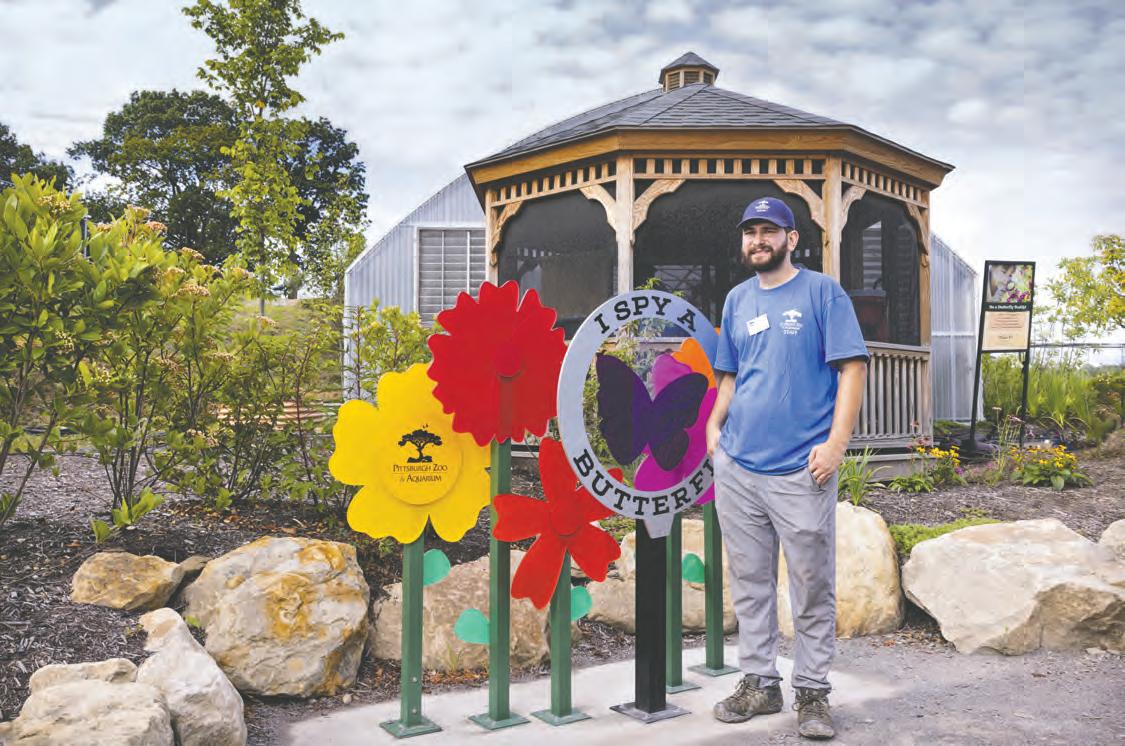
I would say that the people that tore down the posters live on a spectrum. These were people from in their teens to people that are retired, every ethnicity, every background and every age group. And that’s what strikes me the most. There were so many people without skin in the game that joined this cause of taking down these posters.
Some people that tore down the posters did lose family members in Gaza because of Israeli airstrikes. Some people that tore down the posters — they didn’t read what was on the signs. They were told that this is Israeli propaganda funded by the government, and they thought that it needs to be removed. Some of them are college students that thought it was the cool thing to do. And some are antisemites.
So I don’t want to put a label on the entire group of people that tore down the posters, because there are different scenarios in which posters were torn. In any case, this was an attack on freedom of speech, and this was anti-American. And there are enough lampposts in New York to share their
What do you hope viewers will take away from seeing “Torn”?
Empathy is all about putting yourself in someone else’s shoes. I honestly don’t think that people can put themselves in other
people’s shoes, because you can never know what another person is going through, but you can step outside of your own shoes for a quick moment. So that’s all I’m asking. I’m asking for the people who put on the posters to think about these victims and hostages that did nothing wrong. And I’m also asking for understanding from, let’s say, my side, to understand that the number-one reason why people tore down the posters is that the death toll in Gaza kept rising throughout this war.
What has been most surprising about the reception?
I was able to have a film screened in Ivy League universities from Columbia to Harvard to Stanford to NYU. I’m very proud of that. I’m very proud that some of the screenings had people from the encampments. I spoke with American Muslims. I spoke with people from Jordan and from Egypt. I also spoke with Chinese and Venezuelans — I spoke to everyone who came to the screenings. I think maybe the most surprising thing was that there was a Q&A that I couldn’t come to — people just stayed in the theater and talked until the usher told them to leave.
Now there are good reasons to remove hostage posters — all of the living hostages are home. Why is your movie still worth seeing?
For two reasons. First, the hostage families with their loved ones still in Gaza — they are asking for us to stay in the fight. They still need us.
These hostages that were murdered, first kidnapped and then murdered — they are not just Israeli. They are American, and they are also from Nepal, Thailand and Tanzania. They are Christians and Hindus and Buddhists and Muslims and Jews. People from all religions are captive right now because their only sin was to be at the wrong place at the wrong time, and their families deserve to bring them home for a proper burial.
But also, my film is not about Israel or Palestine. My film is about New York and America. I’m dying for the day that the film will not be irrelevant, but we are more tribal and polarized than ever. We exist in different echo chambers and different silos. The poster war did not just tear down the posters, but also tore at the social fabric of the city. We are the most diverse city on the planet, so if we can’t sit down and talk to one another, what are we doing here? We have the biggest Jewish population. We have a huge Muslim population. Antisemitism is at a record high; there’s also Islamophobia that is rising.
But these are not just problems for the Jews or the Muslims. This is a societal problem and the film mostly asks questions. It asks: Can multiple things be true at the same time? Why is empathy a limited resource, and can we have disagreements without dehumanizations? So yes, the film is still much more relevant than ever. PJC
By Deborah Weisberg | Special to the Chronicle
ATorah ark that has been with the Jewish Association on Aging for nearly a century has been installed in the organization’s new personal care complex set to soon open in Squirrel Hill.
The ark was salvaged from the former Charles Morris Nursing and Rehabilitation Center during its transformation into new living quarters, and is the focal point of the building’s worship and connection space.
Like Torah arks universally, it is modeled after the biblical Ark of the Covenant, which contained the stone tablets of the Ten Commandments. The Ark of the Covenant, or Aron Kodesh, was stored in the Holy of Holies in the inner sanctuaries of both the ancient Tabernacle and the Temple in Jerusalem. After the Temple’s destruction, the Torah ark became a focal point in synagogues. Arks vary widely in design, but all have the same spiritual significance.
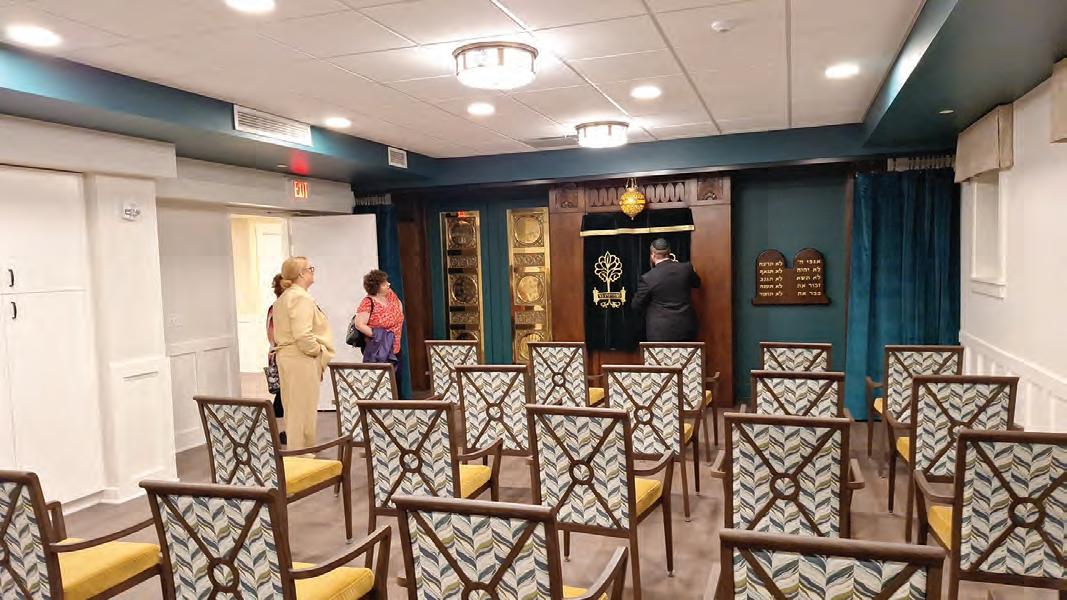
Jewish people on their journey. This ark traveled its journey, too.”
The art deco-style JAA ark dates to at least 1933, when the Jewish Home for the Aged — the precursor to JAA — opened its doors in Squirrel Hill, after nearly three decades in the Hill District, said Eric Lidji, director of the Rauh Jewish History Program & Archives at the Heinz History Center.
“The Home was the second Jewish institution to leave the Hill for Squirrel Hill which, in the 1920s, became the largest Jewish population center in the city. Poale Zedeck was the first to migrate, in 1928.”
The Home might have moved sooner but an effort to purchase the lot where John Minadeo School eventually was built encountered pushback from neighbors, Lidji said. “(The Home) found the property off Browns Hill Road where JAA is today.”
Over the past nine decades, the 15-acre JAA campus has expanded and evolved into an urban village that provides a range of social, wellness and spiritual services to residents and to the broader community. Besides the new personal care complex, the campus includes memory care and The New Riverview independent living and affordable apartments. There are plans to build additional independent living units.
The ark has had several different homes on the campus and, through it all, has been an enduring spiritual presence, said Rabbi Dovid Small, JAA’s director of pastoral care.
“It has a rich history of continuity. It’s like the ark of the temple that traveled with the

Small is the fourth rabbi to serve at JAA since its founding in 1905 by Rabbi Aaron Mordecai Ashinsky. Small’s other predecessors were Rabbis Mordechai Leib Glatstein and Eli Seidman, who retired in 2020.
Seidman helped design the shul at Charles Morris that housed the ark and that also included stained glass windows, which will be preserved, too, said JAA president and CEO Mary Anne Foley.
“It was a beautiful shul and we did not want to demolish it. We worked with contractors to save the ark because it is part of our 100-year history. We also moved the shul’s eternal light and menorah into the worship center.
“Where we could, we’ve included the old with the new.”
Plans are to repurpose the stained glass windows when JAA’s independent living facility is built.
The Columbus, Ohio-based pH7 Architects, a firm that specializes in senior living communities, designed the new personal care complex and sought input from Small in creating the building’s worship space, where the dominant color is green. The parochet, or ceremonial curtains covering the scrolls, are emerald velvet, as they were in the old shul.
“The ark fits beautifully,” Small said, noting that it will house three Torahs. “The constant light shining on the ark reminds us that God is always present.”
Although it is obviously a shul and will be used for Shabbos and all Jewish holiday services, the space is referred to as a flex worship and connection center because not all personal care residents will be
Jewish, Foley said.
It is designed to seat 58, which is the resident capacity of the personal care complex.
The worship space also could be used for other special occasions, she said, recalling when the daughter of a memory care patient got married in a courtyard on campus.
JAA’s decision to keep the ark conveys “a sense of continuity,” Lidji said, noting that not all arks can be conserved when
synagogues remodel, downsize, or shutter
A 2020 Pew Research Center study indicates that in the preceding 20 years more than one-third of Conservative synagogues and one-fifth of Reform synagogues closed.
“There are more arks that need a home than there are homes for them,” Lidji said. “Only a few survive.”
In a perfect world, an ark no longer used would be dismantled and buried, but all too often they wind up, forgotten, in
The Georgia-based Jewish Community Legacy Project helps congregations place their arks and other ritual objects with synagogues in need. The project has worked with several congregations in western Pennsylvania.
That JAA has continually made a place for its ark is significant, said Legacy president and CEO Noah Levine. “What’s beautiful about it is that, as needs change, what becomes constant is this ark. The spirit of God is with this ark wherever the worshippers are.”
“The ark is going to the people, not the other way around.” PJC
Deborah Weisberg is a freelance writer living in Pittsburgh.

Lindsey Aranson and Alexander Downing, both of Pittsburgh, were married on Oct. 12, 2025, at the National Aviary of Pittsburgh. Lindsey is the daughter of Richard and Nancy (Barnett) Aranson. She is the granddaughter of Patti (Greenberger) Shensa and the late Michael Aranson, and of Richard and Barbara (Carter) Barnett. Lindsey is completing her Master of Fine Arts degree at American University. Alexander is the son of Joe and Camille (Post) Downing of Pittsburgh. He is the grandson of the late Hugh and Mabel (Benedict) Downing and of the late Richard and Lorna (White) Post. Alexander manages social media for the Center for Coalfield Justice. Following the ceremony the couple enjoyed a reception surrounded by family and friends. They honeymooned in the Pacific Northwest

Megan and Jay Finkelstein are delighted to announce the marriage, on July 19, 2025, of their son Zach to Dianna Devito, daughter of Lisa and the late Vincent Devito. Zach’s loving grandparents are Sara Spatter and the late Thelma and Art Finkelstein, Sam Spatter and Benjamin Booth. Dianna’s loving grandparents are Charlotte and Vincent Devito and the late Dianne and Frank Morello. Zach and Dianna were married in Huntington, New York, in a beautiful harborside ceremony, surrounded by friends and family, officiated by Rabbi Alan Stein. Zach and


Laurie and Greg Weingart are delighted to announce the marriage of their daughter , son of Jill and Alan Sandler of Scottsdale, Arizona. The wedding took place at Stone Tower Winery in Leesburg, Virginia. Rachel and Gabriel met and live in Washington D.C. PJC

There is a whole lot of movement in Parshat Lech Lecha. We begin the parashah with God’s command to Avram to leave his homeland and go to a new place. Avram, Sarai and their nephew Lot leave Ur Kasdim and wind their way to Shechem in Canaan. But they hardly stay put once they are there. They move to a spot between Beit El and Ai, and then go to the Negev. A famine strikes and they move temporarily to Egypt. From Egypt they return to the Negev, then Beit El again, until finally settling in Hevron.
Avram and Sarai are not the only ones on the move in our parashah. Lot settles in Sodom. Hagar runs away to the wilderness. What are we to make of all this relocation?
The Talmud claims that moving to a new place is one way we can circumvent our destiny (Rosh Hashanah 16b). This may be the source of the Hebrew adage: “meshaneh makom, meshaneh mazal” — change your place, and you change your fortune. I have moved many times in my adult life: from New York to Los Angeles to Jerusalem to Northern California to Boston, and then finally to Pittsburgh. These moves were not easy at all, but I learned about myself in each place, and my life was certainly enriched by those experiences.
Several world religions have a foundational narrative involving a holy man leaving his home and then, in unfamiliar surroundings, discovering God or enlightenment. Siddhartha, a wealthy prince, left his palace at age 29 seeking enlightenment and became the Buddha. Jesus left his birthplace of Nazareth to become a charismatic leader in Capernaum. And of course, Moses himself left Egypt to become a shepherd in Midian, where he encountered God and was given a mission to free the Israelites. Changing one’s physical environment seems to be a necessary step on the path to religious awakening.
This trope has endured in our culture. One of the more popular memoirs of the 21st century, “Eat, Pray, Love,” tells the story of Elizabeth Gilbert’s quest for healing after a painful divorce. She travels to Italy to indulge in gastronomic pleasures, then to India to try out asceticism at an ashram, and then
finally to Bali, where she discovers the transcendence of love. The life lesson implicit in the book is that we can change our internal state by changing our external surroundings. I am skeptical about this method. Looking outwardly to heal what is within can be a form of avoidance. After all, we bring ourselves with us wherever we go. American writer Eudora Welty lived and worked for most of her 92 years in Jackson, Mississippi, in the same house that she moved into at age 16. In her memoir, “One Writer’s Beginnings,” she wrote: “A sheltered life can be a daring life as well. For all serious daring starts from within.” In many ways, I have lived by that creed. I prefer inner exploration to outdoor adventure. Trying to “find yourself” by running to a new place might cause loneliness rather than enlightenment. I believe that personal change happens most successfully when one focuses on it directly. Yet, psychological research does suggest that changing our environment can support internal transformation. For example, the concept of habit discontinuity posits that our behaviors are largely shaped by environmental context rather than conscious choice. When we move to a new place, our habits are disrupted, catalyzing new routines and ways of thinking. A 1980s study of hospital patients demonstrated that those whose windows overlooked trees required less pain medication and recovered more quickly than those patients whose windows faced a brick wall. Eudora Welty and the psychologists are both correct. The message of Lech-Lecha is not that relocation is a superpower. Rashi’s commentary on the command for Avram to leave his land is “Get thee out (literally, go to yourself) — for your own benefit, for your own good.” Departing from the plain meaning of the text, Rashi interprets God’s command not merely as changing your physical location, but as embarking on an internal journey. There is wisdom in the maxim meshaneh makom, meshaneh mazal
But physical environments alone cannot magically transform us. Moving can be a catalyst. But ultimately, we must use a new environment to reinvent ourselves. We must be active participants in our own self-transformation. PJC
Rabbi Amy Bardack is the spiritual leader of Congregation Dor Hadash. This column is a service of the Greater Pittsburgh Jewish Clergy Association.


MARKOVITZ: Arline Markovitz, 95, of Harrisburg, passed away on Saturday, Oct. 18, 2025, at Homeland Center. She was born on July 26, 1930, in Pittsburgh to the late Ben and Sylvia (Jacobs) Steinberg. Arline was a member of Beth El Temple, Harrisburg, a life member and past president of Hadassah, a member of the Beth El Sisterhood and the Jewish Community Center Senior Adult Club in Harrisburg. She was a longtime mahjong player, known for her beautiful singing voice and participated in community theater in McKeesport, Pennsylvania. She was the widow of Harold Markovitz, preceded in death by a brother, Dr. Arthur Surviving are three daughters: Sheryl Sternberg and her husband, Richard, of Monroeville; Bonnie Schatz and her husband, Michael, of Ambler; Marcie Engelson and her husband, Jon, of Denver, Colorado; five grandchildren, David, Elyssa, Harris, Samuel, Matthew; seven great-grandchildren, Nissa, Morgan, Rosie, Sylvie, Florence, Charlotte and Emilia; and a great-great-granddaughter. Funeral services were held at Beth El Cemetery Chapel. Burial in Beth El Cemetery. Arrangements are under the care of the Hetrick-Bitner Funeral Home, 3125 Walnut Street, Harrisburg, PA
To send condolences or to share memories with the family, please go to BitnerCares. Memorial contributions in Arline’s honor may be made to Beth El Temple,
North Front Street, Harrisburg, PA 17110, or to Hadassah, 40 Wall Street, 8th Floor, New York, NY 1005.
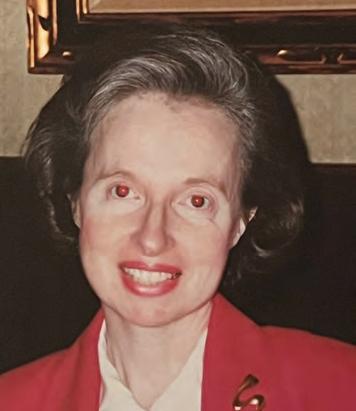
ZISKIND: Norma Jean Ziskind, beloved wife of the late Gerald N. Ziskind, Esq., for over 60 years and loving mother to Deborah Susan Ziskind and Tammy Valerie Ziskind, passed away peacefully at home on Wednesday, Oct. 22, 2025. She was 87. Norma, who grew up in Canton, Ohio, was the sister of Melvin (Harriet) Morris of Cleveland, Ohio. She attended Ohio State University and then finished her senior year at University of Pittsburgh and received her degree in teaching. Norma’s true passion was her volunteer work. She was president of the Pittsburgh chapter of Women’s American ORT for many years. Norma and Gerald hosted many dinner parties for ORT and other Jewish causes. Norma was active in the Tree of Life Congregation. She enjoyed playing the piano, traveling with her family and a competitive game of Scrabble. Norma and Gerald were often seen taking their daily walks at Pitt and the Squirrel Hill JCC. A private graveside service and interment were held at Homewood Cemetery, led by Rabbi Jeffrey Myers. The family suggests that contributions be made to The Tree of Life, Inc. c/o Chatham University, 107 Woodland Road, Pittsburgh, PA 15232, (thetreeoflife.org/donate). Arrangements entrusted to Ralph Schugar Chapel, Inc. schugar.com PJC
Katherine Janus Kahn, illustrator of ‘Sammy Spider’ Jewish children’s books, dies at 83
Sylvia Rouss who had dreamed up a little spider with a big Jewish future.
By Penny Schwartz | JTA
More than 30 years ago, a colorful little eight-legged spider named Sammy made his picture book debut and scurried into the homes of Jewish families across the country.
Sammy Spider and his mother live in a house with a young Jewish boy named Josh Shapiro and his family. Starting with “Sammy Spider’s First Hanukkah,” he romped through Jewish holidays, prayers and practices across more than two dozen books — all illustrated with bright watercolor collages that have made the books instantly recognizable to generations of Jewish children.
That was the work of Katherine Janus Kahn, who died Oct. 6 at age 83.
Janus Kahn, a fine artist also noted for her works on political justice and women’s issues, illustrated more than 50 books for Kar-Ben, a publishing house for Jewish children’s books that counts the “Sammy Spider” franchise as among its best-selling.
“We are heartbroken,” Kar-Ben said in a Facebook post, adding, “We are profoundly grateful for her legacy, and for the countless stories and memories she leaves behind.”
David Lerner is the CEO of Lerner Publishing Group, the parent company of Kar-Ben, the country’s largest publisher of Jewish children’s books.
“Katherine’s art and storytelling helped shape the landscape of Jewish children’s literature,” he said in an email. “Her books have been recognized with many national awards, honoring her creative vision and her lasting impact.”
Kar-Ben was a tiny company when it first connected with Janus Kahn in the early 1990s. She had drawn attention with her paper-cut illustrations for “The Family Haggadah,” which became a bestseller when it was published in 1987, and the publisher wanted to pair her with an author named
“We liked her many styles and thought the collage work would be fun for Sammy’s Hanukkah,” Judye Groner, Kar-Ben’s founder, wrote in an email. “We had no idea that Sammy would become a children’s favorite character featured in over 20 books.”
In that first title, the curious little arachnid spies the young Josh celebrating Hanukkah, wishes he could warm his spider legs on the menorah and wants to spin the colorful dreidels that Josh gets every night.
“Silly Sammy. Spiders don’t light Hanukkah candles. Spiders spin webs,” his mother tells the disappointed Sammy. The catchy refrain repeats for Hanukkah’s eight nights when his mother gives Sammy eight spider socks spun with colorful dreidels, just like the ones Josh gets.
Over the next three decades, Sammy learned about empathy in “Sammy Spider’s First Mitzvah,” celebrated the entire Jewish holiday cycle from Rosh Hashanah to Shavuot and stowed away in Josh’s luggage in “Sammy Spider’s First Trip to Israel.” The most recent book, “Sammy Spider’s Big Book of Jewish Holidays,” came out this year and compiles many of the classic stories that are now widely distributed to Jewish families through PJ Library.
Janus Kahn’s art brought the characters sparkling to life, according to Heidi Rabinowitz, past president of the Association of Jewish Libraries and host of the Book of Life Podcast about Jewish children’s literature.
“Her rainbow-soaked collage artwork give the Sammy Spider books a huge advantage,” Rabinowitz wrote in an email. “They make Sammy and Mrs. Spider friendly and even beautiful, completely removing the ‘ick factor’ from their arachnid identity.”
For Janus Kahn, who studied art at Jerusalem’s Bezalel Academy after graduating from the University of Chicago, the work connected to her core identity. In a 2017
watercolor essay, she said her study at Bezalel came after she volunteered to support Israel during the Six-Day War in 1967 and headed to Israel, where she said “reconciliation felt possible,” even after the war’s end.
“My Judaism and my books are tied
together so integrally that I don’t think I could ever untie them,” she said in a 2013 video with Rouss that showed her demonstrating her artistic techniques in her home studio.
Please see Kahn, page 24

A
Anonymous .Herbert B Marks
Anonymous .Leroy E Broder
David and Judith Clovsky Irving Clovsky
Susan Cohen Robert Cohen
Marlene Goldstein Capt M Allan Rudick
Shirley L Hirsch .Max I Levine, Raschel G Levine, Edward J Levine
Susan N Johnson Dr Seymour A Herron
Carole Kaufman Morton Goldblatt
Sharon Knapp Ida Frankel
Sharon Knapp .Anna Sadowsky
Sharon Knapp .Honey Sadowsky Klein
Harold & Cindy Lebenson Michael J Niderberg
Linda Levine .Arthur Levine
Maxine & Larry Myer Diana Z Myer
Ronald M Tepper Harry Tepper
Edris C Weis .Martha Weis
Contact the Development department at 412-586-2690 or development@jaapgh.org for more information. THIS WEEK’S YAHRZEITS —
Sunday November 2: Arthur Levine, Solomon Linder, Jennie Rosen, Mayer Eli Ruben, Rose Shapiro, Freda Siegel, Dora Sriglitz Wechsler, Charles Weiss
Monday November 3: Benjamin C Brown, Evelyn Wolk Caplan, Ruben Cohen, Sarah N Cohen, Dr Bernard Cramer, Samuel T Greenberg, Frank Grossman, Dr Seymour A Herron, Ida Kaplan, Dena Katzenberg, Morris Krantz, Minnie M Lavine, Raymond Paul Lazier, Rebecca Paris, Adolph Roth, Nina Ruben, Anna Sadowsky, Leonard Schulhof, Helen R Seiavitch, George Sherman, Doris Wechsler
Tuesday November 4: Goodman George Altman, Jacob L Berkovitz, Leo Berkovitz, Sylvia Breman Braun, William Cohen, Sidney Leo Friedman, Jennie Gernstat, William Glasser, Helen B L Hersh, Norman Katz, Rachel Klahr, Arnold Klein, Nathan A Kopelman, Phillip Levy, Edwin E Lichtenstul, Michael J Niderberg, Paul Numerosky, David Rosen, Meyer David Rosenthal, Harry H Samuels
Wednesday November 5: William Darling, David Friedman, Miriam Magadof Glantz, Sadie Goldberg, Goldie Gross, Sam L Herer, Louis Kaufman, Sarah Krimsky, Louis Max Labovick, Diana Z Myer, Capt Morris A Rudick, Philip George Savage, Goldie Schwartz, Mary Smalley, Sara R Solow, Dr Marshall Steinberg
Thursday November 6: Belle Abramson, Leroy E Broder, Samuel Chaban, Bella Chotiner, Edward Goldstein, Isadore Goodman, Samuel Greene, Regina Labowitz, Sam Markowitz, Jennie Murstein, Minnie Protetch, Samuel Segal, Ben Smolar, Ben Vinocur, Florence H Weiss
Friday November 7: Freda S Barbrow, Sadie Brand, Philip L Escott, Lottie Haas Fried, Morton Goldblatt, Esther Green, William S Lichtenstul, Mollie Malt, Addie Mayer, Ida Stein Morgan, Dr Irving Perlmutter, Louis Pollock, Rose Richmond, Anna Snyder, Dorothy J Spolan, Max Stein, Selma Zober
Saturday November 8: Irving Clovsky, Bessie Cohen, Samuel E Jacobson, Sarah Levine, Max Lipkind, Doris Lipner, Joseph Mandel, Herbert B Marks, Grace Miller, Aron Reznick, Lena Schuster, Myra Fern Seder
Kahn:
Continued from page 23
Among her other titles was “The Hardest Word: A Yom Kippur Story,” published in 2001, the first in a series written by Jacqueline Jules about a Ziz, a large, magnificently colored Jewish mythological bird. Like Sammy Spider, the Ziz books struck a chord and are now part of the canon of Jewish children’s books.
“She was just so creative,” recalled Jules, who had multiple books illustrated by Janus Kahn. Their first book together, “Once Upon a Shabbos,” published by Kar-Ben in 1998, was about a bear who gets lost in Brooklyn just before the start of Shabbat. Jules was struck by how Janus Kahn’s illustrations added new texture to a story inspired by an Appalachian folktale.
She and Janus Kahn realized they lived near each other in the Washington, D.C., area. After meeting at an event for the book, they headed to a coffee shop for a two-hour

conversation that launched a decades-long professional relationship and close friendship.
They socialized together, along with Groner, who also lived nearby.


The two were paired up for the Ziz books, another series that has charmed generations of Jewish children. For those books, Janus Kahn created a fanciful creature using paints rather than collage.
“She borrowed different characteristics from a variety of birds. The legs were from
a flamingo, the feet were from a rooster,” Jules said.
Now, the Ziz has taken on a life of its own, making appearances in synagogue plays and other programs based on the books. Just a few weeks ago, Jules saw a photo of someone who dressed up as the Ziz at a synagogue event for Yom Kippur, in keeping with the first book’s theme.
Janus-Kahn would often join Jules for a Ziz storytelling at Jewish venues, bringing a feltboard to embellish the Ziz props and a hand-made Ziz puppet that Jules used. At one memorable event, at the National Museum of Women in the Arts, Janus Kahn arrived with two colorful feather boas, Jules recalled.
“She made the Ziz come alive,” she said. With Janus Kahn’s death, Jules, Groner and Rouss not only lost the gifted master illustrator for their books. They have also lost a treasured friend of many decades.
“Kathy was a gift and our friendship was a gift,” Jules said.
Janus Kahn is survived by her husband, David Kahn, and a son, Robert. PJC






























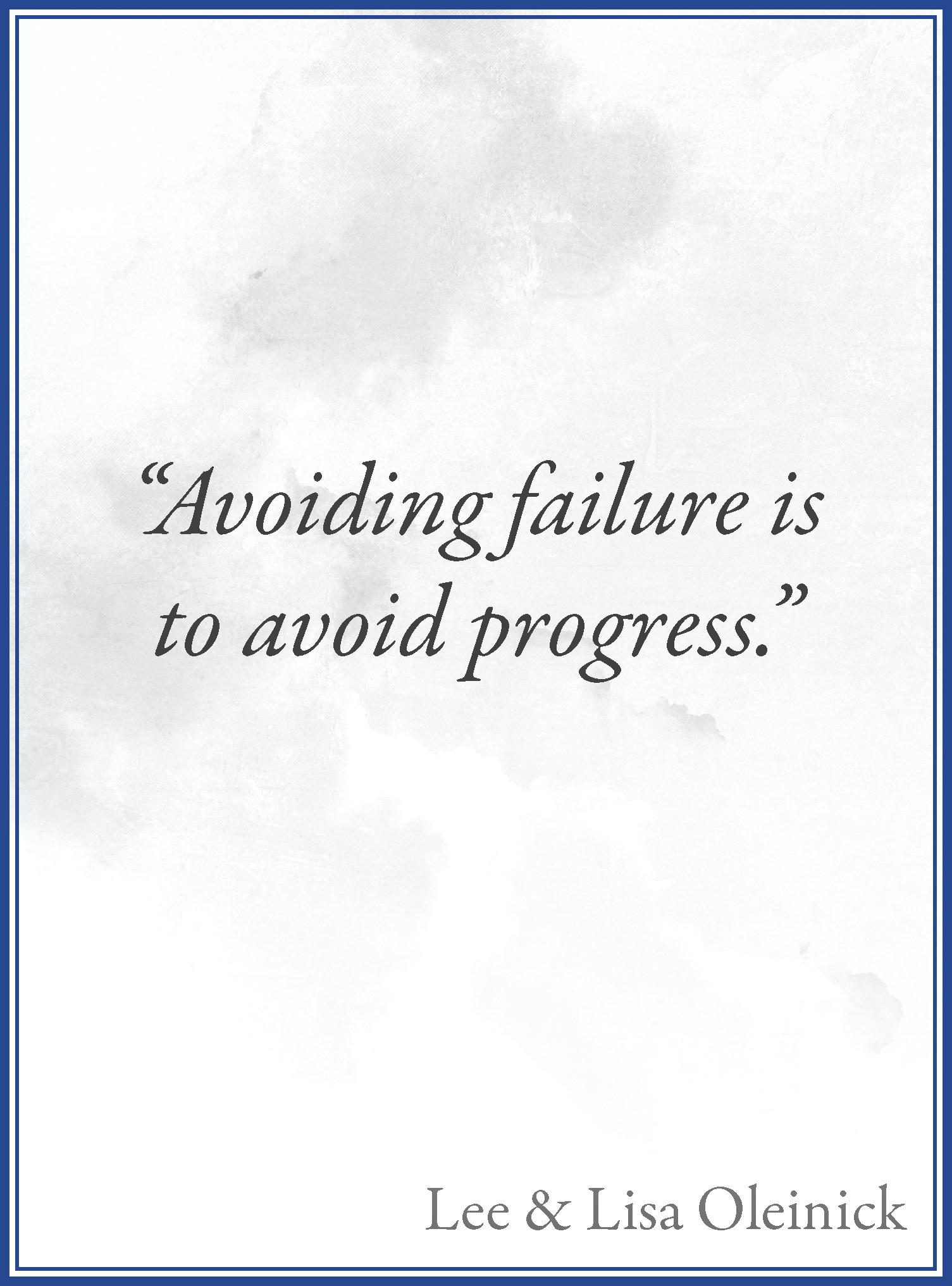

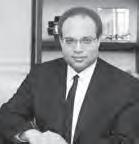


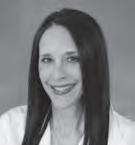



Smith-Rosenthal Team
Jason A. Smith & Caryn Rosenthal Jason: 412-969-2930 | Caryn: 412-389-1695 Jasonasmith@howardhanna.com Carynrosenthal@howardhanna.com


Sherri Mayer, Realtor Squirrel Hill Office C: 412-760-0412 O: 412-421-9121x225 sherrimayer@howardhanna.com HowardHanna.com
5125 Fifth Ave. 2 & 3 Bedrooms Corner of Fifth and Wilkins Spacious 1500-2250 square feet ”Finest in Shadyside” 412-661-4456 www.kaminrealty.kamin.com



5 TIMES A WEEK.

Sign up


We take pride in a holistic approach, streamlining design & construction for a smooth, e cient, and collaborative experience.
Let's work together
“We turned to J.A Lott Design & Associates. eir thoughtful design made our new space not only practical and accessible, but also lled with the warmth, color, and character that re ect the life we’ve built together.” Transforming space with ease >> Residential >> Design Build >> Hospitality Lounge 45 years of exceptional interior design in Pittsburgh

If you're ready to get your next design project o the ground, we want to hear from you! Contact us today for a free consultation to determine if J.A. Lott Design & Associates can bring your vision to life.
and airy center hall with exciting kitchen and first floor laundry. See the great bathrooms and more.
First
J.A. Lott Design & Associates • North Squirrel Hill 412.421.9330 • www.jalott.com • jan@jalott.com



By JNS Staff

and involvement in the conduct of the affairs of the Judean kingdom.”
ONLY JEWISH JUSTICE ON THE PENNSYLVANIA

JUSTICE WECHT IS THE ONLY JEWISH JUSTICE ON THE PENNSYLVANIA SUPREME COURT
ELECTION DAY | TUESDAY, NOVEMBER 4
NOVEMBER
POLLS OPEN FROM 7:00 A.M. TO 8:00
POLLS OPEN FROM 7:00 A.M. TO 8:00 P.M.
POLLS OPEN FROM 7:00 A.M. TO 8:00 P.M.
POLLS OPEN FROM 7:00 A.M. TO 8:00 P.M.
LAST DAY TO REGISTER : MON., OCT. 20
Analysis of the inscription—which specifies a due date: the first of the Hebrew month of Av, in a calendar shared between JUSTICE WECHT IS THE ONLY JEWISH JUSTICE ON
ELECTION DAY | TUESDAY, NOVEMBER
LAST DAY TO REGISTER : MON., OCT.
ELECTION DAY | TUESDAY, NOVEMBER 4
LAST DAY TO REGISTER : MON., OCT. 20
POLLS OPEN FROM 7:00 A.M. TO 8:00 P.M.
LAST DAY TO REGISTER : MON., OCT. 20
LAST DAY TO REQUEST A MAIL-IN or ABSENTEE BALLOT: TUES., OCT. 28
LAST DAY TO REQUEST A MAIL-IN or ABSENTEE BALLOT: LAST DAY TO RETURN YOUR COMPLETED BALLOT:
LAST DAY TO REGISTER : MON., OCT. 20
LAST DAY TO REQUEST A MAIL-IN or ABSENTEE BALLOT: TUES., OCT. 28
LAST DAY TO RETURN YOUR COMPLETED BALLOT: TUES., NOV. 4, 8:00 PM
LAST DAY TO REQUEST A MAIL-IN or ABSENTEE BALLOT: TUES., LAST DAY TO RETURN YOUR COMPLETED BALLOT: TUES., NOV.
LAST DAY TO REQUEST A MAIL-IN or ABSENTEE BALLOT: TUES., LAST DAY TO RETURN YOUR COMPLETED BALLOT: TUES., NOV. 4,
LAST DAY TO RETURN YOUR COMPLETED BALLOT: TUES., NOV. 4, 8:00 PM


Dignifying a sacred space
The Jewish Cemetery and Burial Association of Greater Pittsburgh and the 10.27 Healing Partnership welcomed volunteers to Beth Abraham Cemetery on Oct. 26. The Sunday morning cleanup was one of several communitywide volunteer efforts honoring the 11 people who were killed in the Pittsburgh syn agogue shooting on Oct, 27, 2018.
Cleaning and commemorating
Blazing out of the holidays
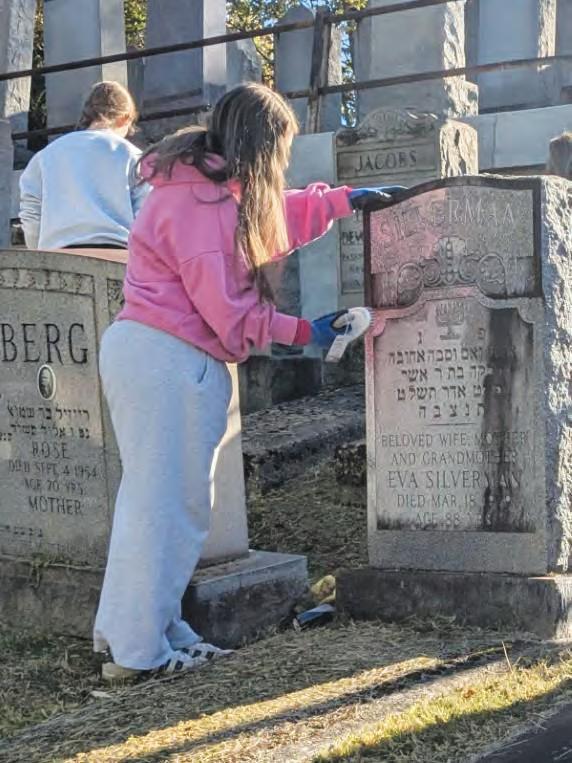
Community members visited Rose’s Garden at the Jewish Community Center in Squirrel Hill and performed a fall cleanup. The Oct. 26 undertaking was one of several volunteering opportunities organized by the 10.27 Healing Partnership honoring the 11 people who were killed in the Pittsburgh synagogue shooting.
tackled with tech
Runners from Hillel Academy of Pittsburgh’s boys varsity team placed third at the East End Cross Country Grade School Championships.

Paradise found
University of Pittsburgh alum Rabbi Leon Morris, director of the Pardes Institute in Jerusalem, met with students during a visit to Pittsburgh.
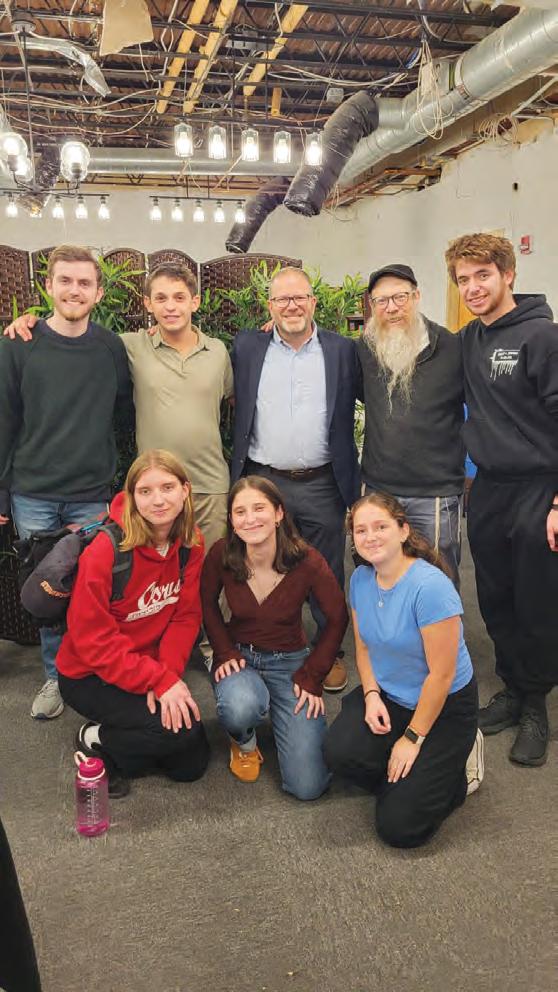
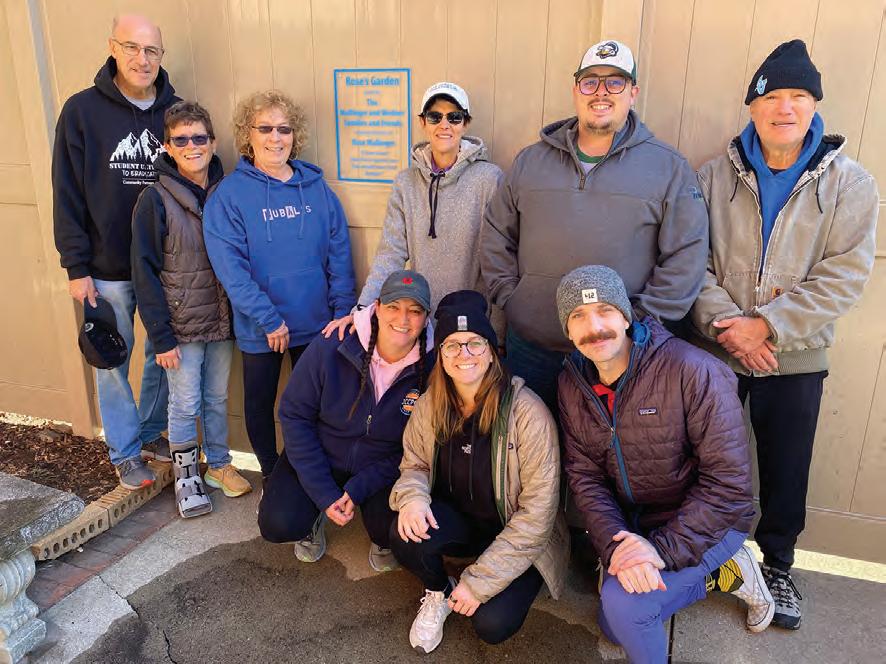
Before the Hebrew month of Tishrei concluded, students from the religious school serving the combined congregations of Congregation Beth Shalom, Rodef Shalom Congregation and Temple Sinai used a 3D printer to design models of sukkahs.
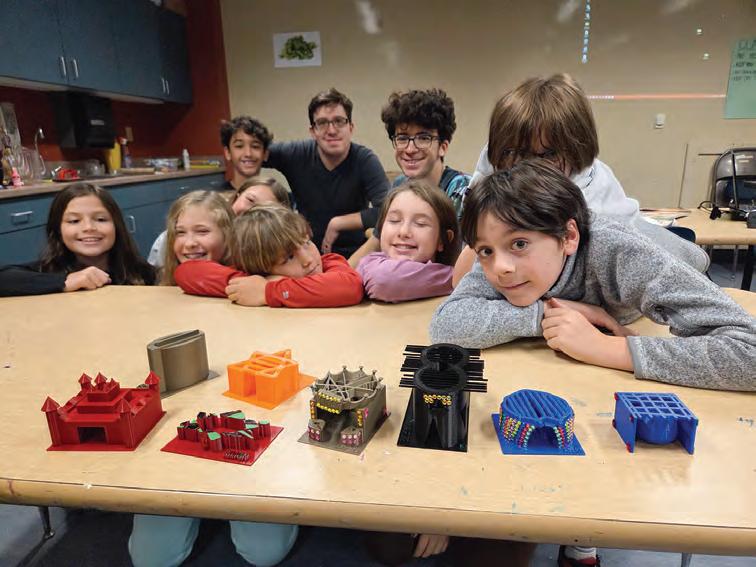
We wear pink AEPhi sisters from the University of Pittsburgh gathered at Hillel JUC to celebrate Pink Week activities and learn about various mitzvot for Breast Cancer Awareness Month.
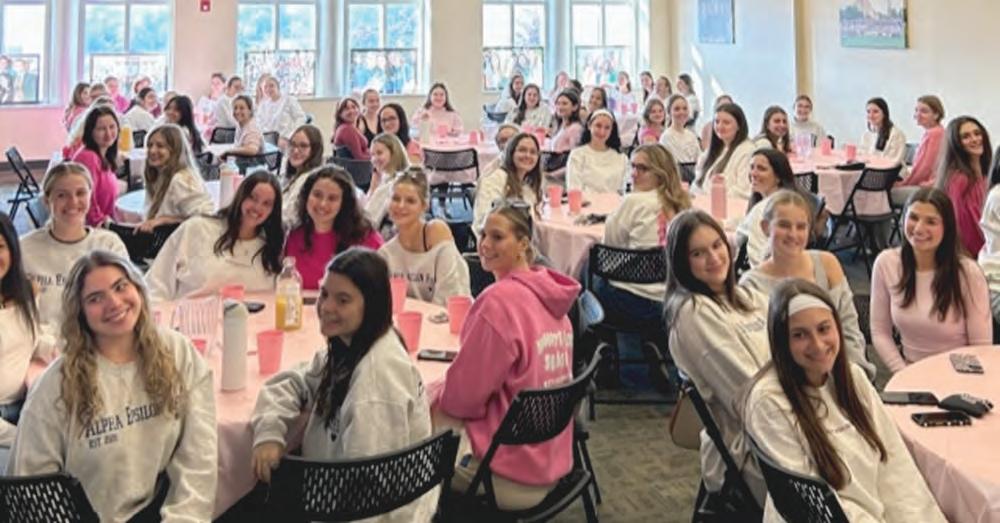
Saturday, November 8 thru Thursday, November 13, 2025 Registration
OPENING NIGHT
Saturday 11/8/25
7:00p - 7:20p Havdalah & a moment of silence in commemoration of 18th of Cheshvan HEADLINER
7:30p - 8:45p Sam Sussman, Boy from the North Country
8:45p - 10:00p Book signing, desserts & Bob Dylan music
Sunday 11/9/25
10:30a - 6:00p Book Sale in Palkovitz Lobby with Riverstone Books
CHILDREN AND FAMILY PROGRAM
10:00a - 11:00a Storytime and kid-friendly activities with children’s book author
LOCAL AUTHOR BOOKSHELF, 1:00p - 5:45p
1:00p - 1:45p Dr. Jonathan Zisook, From Centre to Periphery and Beyond
2:00p - 2:45p Dr. Richard H. Weisberg, Law, Literature and History
3:00p - 3:45p Audrey Glickman, Pockets & Howie Ehrlichman, Not a Bad Trip?
4:00p - 4:45p Ilene Winn-Lederer, An Illuminated Torah Commentary
5:00p - 5:45p Chris Hall, Mythic Judaism HEADLINER
7:30p - 8:45p Dr.Ilan Stavans, Sabor Judío
Monday 11/10/25
HEADLINER
7:30p - 8:45p Joshua Leifer, Tablets Shattered
Tuesday 11/11/25, Veteran’s Day
SPONSORED SPEAKER
7:30p - 8:45p Adam Sobsey, Jewish Appendix
Wednesday 11/12/25
12:00p - 1:15p David and Susan Schwartz, The Joy of Costco David and Susan will be joining us via Zoom. HEADLINER
7:30p - 8:45p Jonathan Harounoff, Unveiled
Thursday, 11/13/25
CLOSING NIGHT
6:30p - 7:15p Klezmer music and snacks HEADLINER
7:30p - 8:45p Jeremy Dauber, Jewish Comedy





